Mitchell Hadley's Blog: It's About TV!, page 63
November 21, 2022
What's on TV? Thursday, November 25, 1976
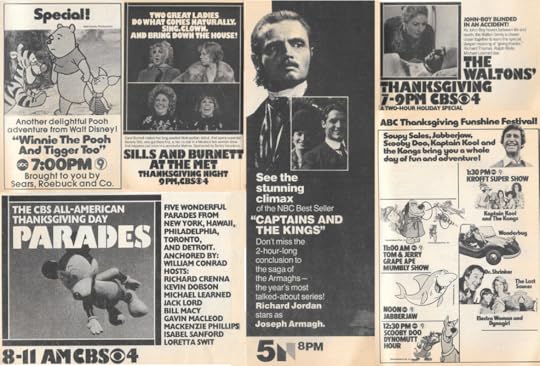
 As I mentioned on Saturday, there's so much to this week, I figured I'd save the Thanksgiving commentary for today.
As I mentioned on Saturday, there's so much to this week, I figured I'd save the Thanksgiving commentary for today. It's a particularly nostalgia-heavy day, starting at 8:00 a.m. with the parade coverage on CBS and NBC. As opposed to the (quite frankly) awful coverage that CBS has nowadays, which consists of a poor imitation of NBC's already bad Macy's broadcast, the 1970s featured William Conrad as our avuncular host in the New York studio (a warm and welcoming set complete with fireplace and decorations), from where he would send us to five parades, featuring stars of various CBS programs. Jack Lord was always the host in Hawaii (natch), but we also have Richard Crenna, Kevin Dobson, Michael Learned, Bill Macy, Gavin MacLeod, Mackenzie Phillips, Isabel Sanford, and Loretta Swit announcing from parades in Toronto, Detroit, Philadelphia, and New York. This was my preferred broadcast, and I'd always set the alarm to make sure I was up in time to see it—after all, who wouldn't prefer five parades to one? That one is the Macy's parade on NBC, also at 8:00, with Ed McMahon and Shari Lewis hosting the pre-parade, and then Ed joining Della Reese and McLean Stevenson joining the parade itself. I love the balloons and floats; my problem with Macy's has always been the "entertainment," with pop singers doing bad lip-synching to songs that I can't stand. And by the way, get off my lawn.
ABC has college football on Friday, which is why they're having their traditional day of Saturday morning kids' shows, starting 11:00 a.m., with Soupy Sales as host. It was always special seeing Saturday cartoons on another day; it added to the feeling that this day was special. Thursday afternoon football does that as well, and in addition to the NFL doubleheader, CBS tries an NBA special at noon. That did not become a tradition.
I really appreciate how the networks go all-out on Thanksgiving night. I think that they mostly show reruns these days, figuring that it's not a big TV day, but in 1976 they were still figuring that families might sit around the set after dessert (or perhaps before second helpings), and they saved some big shows for the occasion. CBS has a special two-hour Waltons' Thanksgiving at 7:00 p.m.—will John-Boy come back from being blinded in an accident? It was originally shown in 1973, but what better occasion to rerun it? That's followed by Beverly Sills and Carol Burnett in a two-woman show from the Metropolitan Opera House (9:00 p.m.) that's reminiscent of Burnett's 1960s specials with Julie Andrews at Carnagie Hall.
Over at NBC, a first-run episode of Dick Van Dyke's short-lived variety show at 7:00 is followed by the two-hour conclusion of Captains and the Kings, the star-studded nine-hour miniseries that was quite the show; I don't quite know if it's fair to call it a "sensation," but these was the heydays of the miniseries, Captains and the Kings was an engrossing hit, and it's unthinkable that NBC would show it on Thanksgiving night unless they expected a healthy audience.
ABC's not left out; after the charming, animated Winnie the Pooh and Tigger Too (narrated by Sebastian Cabot), it's the traditional Thanksgiving rivalry between Texas and Texas A&M (traditional, that is, until the two schools joined different conferences and decided not to play each other at all); depending on where you live, you might instead see Colgate at Rutgers, or Appalachian State at East Carolina.
All in all, it's a totally satisfying day, particularly with all three networks offering special programs of one kind or another in primetime. It's what I said earlier—it makes the day feel special, and the turkey, potatoes and gravy only add to it. You can relive it all in this Minneapolis-St. Paul edition.
-2- KTCA (PBS) MORNING 10:00 ELECTRIC COMPANY—Children 11:30 SESAME STREET AFTERNOON 12:30 MISTER ROGERS 1:00 MacNEIL/LEHRER REPORT 1:30 BOOK BEAT 2:00 EVENING AT SYMPHONY 3:00 GETTING ON—Report 3:30 OUNCE OF PREVENTION 4:00 MISTER ROGERS 4:30 SESAME STREET 5:30 ELECTRIC COMPANY—Children EVENING 6:00 GUPPIES TO GROUPERS 6:30 MacNEIL/LEHRER REPORT 7:00 INQUIRY 7:30 PERSPECTIVES 8:00 VISIONS—Drama “The Great Cherub Knitwear Strike” [After the drama: a spoof of on-the-spot TV news coverage] 9:30 JEANNE WOLF WITH. . . Guest: Edith Head 10:00 WOMAN 10:30 MacNEIL/LEHRER REPORT 11:00 THIN EDGE—Mental Health
-4- WCCO (CBS) MORNING 6:00 CBS NEWS—Morton/Rudd 7:00 CARMEN 7:30 CLANCY AND WILLIE 8:00 THANKSGIVING DAY PARADE COVERAGE Special [Pre-empts regular programming] 11:00 SKI SHOW AFTERNOON 12:00 NBA BASKETBALL Special: Washington Bullets at Phoenix Suns [Pre-empts regular programming] 2:00 NFL TODAY 2:30 NFL FOOTBALL Special: St. Louis Cardinals at Dallas Cowboys 5:30 CBS NEWS—Walter Cronkite EVENING 6:00 NEWS 6:30 ANDY WILLIAMS—Variety Guest: Wayne Newton 7:00 WALTONS “The Thanksgiving Story” [Expands to two hours, pre-empting regular programming] 9:00 SILLS AND BURNETT AT THE MET Special [Pre-empts regular programming] 10:00 NEWS 10:35 SCENE II—Dave Moore 11:00 MOVIE—Musical “High Society” (1956) 12:30 MOVIE—Crime Drama “The Doberman Gang” (1972) 2:20 NEWS
-5- KSTP (NBC) MORNING 5:45 MINNESOTA TODAY 6:15 TAKE KERR 6:20 GRANDPA JIM 6:30 LASSIE—Drama 7:00 TODAY—Tom Brokaw Guests: Chinese Acrobats of Taiwan 8:00 THANKSGIVING DAY PARADE COVERAGE Special [Pre-empts regular programming] 11:00 GRANDSTAND 11:30 NFL FOOTBALL Special: Buffalo Bills at Detroit Lions AFTERNOON 2:30 FIGURING ALL THE ANGLES—Documentary [Pre-empts regular programming] 3:30 BRADY BUNCH—Comedy 4:00 EMERGENCY ONE!—Drama 5:00 THE MASK AND YOU 5:30 NBC NEWS—Chancellor/Brinkley EVENING 6:00 NEWS 6:30 BOWLING FOR DOLLARS 7:00 DICK VAN DYKE—Variety Guests: Freddie Prinze, George Foreman, the Spinners 8:00 BEST SELLERS—Drama “Captains and the Kings,” conclusion [Beginning next week on “Best Sellers”: an adaptation of Anton Meyer’s “Once an Eagle”] 10:00 NEWS 10:30 JOHNNY CARSON Guest hostess: Joan Rivers. Guests: Michael Medved, David Wallechinsky 12:00 TOMORROW—Tom Snyder 1:00 MOVIE—Adventure BW “Professional Soldier” (1936)
-9- KMSP (ABC) MORNING 7:00 GOOD MORNING, AMERICA—David Hartman 9:00 PHIL DONAHUE Guest: William Holden 10:00 FAMOUS CLASSIC TALES—Cartoon “The Last of the Mohicans” 11:00 TOM & JERRY/GRAPE APE/MUMBLY—Cartoon AFTERNOON 12:00 JABBERJAW—Cartoon 12:30 SCOOBY-DOO/DYNOMUTT—Cartoon 1:30 KROFFT SUPERSHOW—Children 3:00 DINAH! Guests: Bing Crosby, Phil Harris, Pat Boone, Dong Kingman 4:00 MIKE DOUGLAS Co-host: Zsa Zsa Gabor. Guests: Paul Newman, Robert Conrad, Jack Klugman (on tape), Stan Kann 5:30 ABC NEWS—Reasoner/Walters EVENING 6:00 NEWS 6:30 MATCH GAME PM Richard Dawson, Charles Nelson Reilly, Brett Somers, Greg Morris, Fannie Flagg, Elaine Joyce. Host: Gene Rayburn 7:00 WINNIE THE POOH AND TIGGER TOO—Cartoon Special [Pre-empts regular programming] 7:30 COLLEGE FOOTBALL Special: Texas A&M at Texas 10:30 NEWS 11:00 STREETS OF SAN FRANCISCO—Crime Drama [Time approximate after football] 12:10 DAN AUGUST—Crime Drama [If the college-football game played earlier this evening runs long, “Dan August” may be pre-empted] 1:20 NEWS
11 WTCN (Ind.) MORNING 6:30 WHAT’S NEW? 7:00 ROMPER ROOM 7:30 POPEYE AND PORKY—Cartoons 9:00 FLINTSTONES—Cartoon 9:30 THAT GIRL—Comedy 10:00 FATHER KNOWS BEST BW 10:30 ANDY GRIFFITH—Comedy 11:00 WHAT’S NEW? AFTERNOON 12:00 I DREAM OF JEANNIE—Comedy 12:30 LUCY SHOW 1:00 MOVIE—Drama “Count Three and Pray” (1955) 3:00 GOMER PYLE, USMC 3:30 FLINTSTONES—Cartoons 4:00 BEWITCHED—Comedy 4:30 GILLIGAN’S ISLAND 5:00 FAMILY AFFAIR—Comedy 5:30 PARTRIDGE FAMILY EVENING 6:00 MY THREE SONS—Comedy 6:30 ADAM-12—Crime Drama 7:00 FBI—Crime Drama 8:00 MERV GRIFFIN Guests: Robert Conrad, David Brenner, Dody Goodman, Rita Moreno, Gregory “Pappy” Boyington 9:30 NEWS 10:00 MARY HARTMAN, MARY HARTMAN—Serial 10:30 ODD COUPLE—Comedy 11:00 LOVE AMERICAN STYLE 11:30 HONEYMOONERS—Comedy BW 12:00 IRONSIDE—Crime Drama 1:00 ALFRED HITCHCOCK—Drama BW 1:30 ALFRED HITCHCOCK—Drama BW
17 KTCI (PBS) EVENING 7:00 MASTERPIECE THEATRE “How Green Was My Valley,” Part 3 8:00 SOUNDSTAGE Guests: Janis Ian; Blood, Sweat and Tears 9:00 BOOK BEAT Guest: Anne Baxter, “Intermission” 9:30 LILIAS, YOGA AND YOU 10:00 OURSTORY 10:30 EARTHKEEPING [Captioned for the hearing-impaired]
TV
Published on November 21, 2022 05:00
November 19, 2022
This week in TV Guide: November 20, 1976
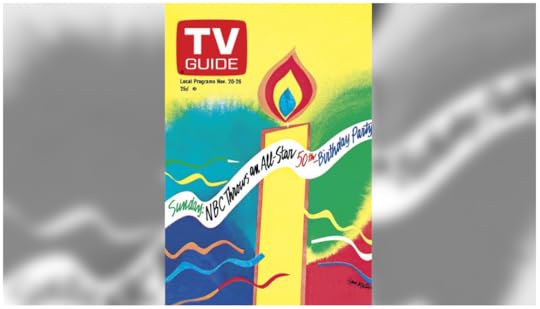
 True story: I was leafing through the pages of today's issue, getting ready to do some typing, and I started reading out loud some of the blockbuster programs that were on. Parades! Football! NBC's anniversary special! What a terrific week, I said.
True story: I was leafing through the pages of today's issue, getting ready to do some typing, and I started reading out loud some of the blockbuster programs that were on. Parades! Football! NBC's anniversary special! What a terrific week, I said."You must have been in seventh heaven," my wife said.
My face clouded over. "This is while I was living in the World's Worst Town™, remember?"
"Oh," she said after a moment.
It occurred to me then that it had been awhile since I’d had a really good rant about the World’s Worst Town™, and I was overdue for one. Now, I realize you didn't come here to listen to me gripe about this, but that's what you're going to do anyway, at least for the next few minutes. The WWT, we'll call it for the sake of convenience, is the small town in which I spent the so-called formative years of my life, from ages 12-18. While we lived there, we had access to one commercial television station, an NBC/ABC affiliate. There was a PBS station. On occasion there was a snowy picture from an out-of-state CBS affiliate. And that was it, which meant that 90 percent of our television viewing was restricted to NBC. For someone who may have been a descendent of Mike Teavee, it was—well, I don't really have the vocabulary to describe what it was like, at least not that I can use here.
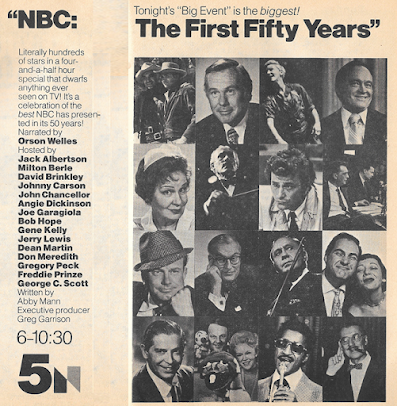 I will allow as to how this arrangement did have one benefit this week: I was able to watch NBC's magnificent 50th anniversary show (Sunday, 6:00 p.m.) The four and one-half hour program, narrated by Orson Welles and featuring just about every living star who's ever appeared on the network, goes all the way back to the days of radio, and because television itself only makes up about have of the history, the program doesn't suffer from the recency bias that plagues so many of these kinds of shows today. Looking through some of the highlights, you get a really impressive look at the breadth of NBC's hits over the years: Rowan and Martin's Laugh-In; This is Your Life; Kukla, Fran and Ollie; The Wonderful World of Disney; Bonanza; The Tonight Show; Peter Pan; the Halmark Hall of Fame; Milton Berle's Texaco Star Theater; Mutual of Omaha's Wild Kingdom; Martin and Lewis on The Colgate Comedy Hour; Dr. Kildare—among others. There are also highlights of Rose Bowls and World Series, the moon landing and the JFK assassination, Dean Martin and Frank Sinatra, Rudy Vallee, and Bob Hope. The program ends with a tribute to David Sarnoff.
I will allow as to how this arrangement did have one benefit this week: I was able to watch NBC's magnificent 50th anniversary show (Sunday, 6:00 p.m.) The four and one-half hour program, narrated by Orson Welles and featuring just about every living star who's ever appeared on the network, goes all the way back to the days of radio, and because television itself only makes up about have of the history, the program doesn't suffer from the recency bias that plagues so many of these kinds of shows today. Looking through some of the highlights, you get a really impressive look at the breadth of NBC's hits over the years: Rowan and Martin's Laugh-In; This is Your Life; Kukla, Fran and Ollie; The Wonderful World of Disney; Bonanza; The Tonight Show; Peter Pan; the Halmark Hall of Fame; Milton Berle's Texaco Star Theater; Mutual of Omaha's Wild Kingdom; Martin and Lewis on The Colgate Comedy Hour; Dr. Kildare—among others. There are also highlights of Rose Bowls and World Series, the moon landing and the JFK assassination, Dean Martin and Frank Sinatra, Rudy Vallee, and Bob Hope. The program ends with a tribute to David Sarnoff.Ellen Torgerson's accompanying article shows how difficult it is to put together a program like this; it was over a year in the making, and the video archives weren't nearly as helpful as producer Greg Garrison would have liked. "We found lots of things missing, or they'd been erased or given away or stolen. And one of the warehouses was destroyed by fire." The storage building in New Jersey contained thousands of cans of film; they were labeled, all right, but there was no cataloging system, which meant "it might have taken 10 years to look through all those tins of tape to find, say, Grace Kelly in Lights Out." Garrison recounts the search for a color print of a 1957 Gene Kelly special with Donald O'Connor. A black-and-white print was located in Akron, but Garrison really wanted color. Finally, six weeks before the show, and resigned to using the B&W clip, Garrison was out shoveling hay in the barn of his horse farm, "and under an old pule of hay I found this box. There it was, a color print of the Kelly show, right in my own barn." He'd stored tapes of all the shows he'd produced in the rafters of the barn, and this one had fallen through an opening and into a bale of hay, unnoticed until his cleaning. It may have been a lot of work putting the special together, but it's worth it.
All three broadcast networks would arrive at milestone anniversaries in the next a couple of years, and each one approached their anniversary programs in different ways. CBS spread their celebration over an entire week, devoting each night to a particular genre; ABC, which had no radio history to speak of and was recognizing its 25th anniversary, put on a show that was more like a series of tributes at an awards show, with a live audience to boot. The NBC celebration is a show apart, though; with a script by Oscar winner Abby Mann, it combines gravitas, celebrity and history, and brings home the storied legacy of the Peacock Network. If nothing else, I'm grateful to the WWT for giving me the chance to see it.
l l l
As I said, it's a very, very good week of television; Thanksgiving week was often that way. The college football season's almost over, so you've got plenty of big games between big rivals. There are plenty of specials on—movies, variety shows, and the like; there's so much to look at that I've decided to treat Thanksgiving Day itself separately, on Monday.
And, as I've progressed through this issue, it happens that I'm able to judge pretty much everything about this week based on whether or not I had access to it in the WWT. That's the key, I think; not that I would have watched it, but that I could have if I'd wanted to. For instance, I'm pretty sure that KCMT carried the Big Ten showdown between Michigan and Ohio State (Saturday, 11:45 a.m., ABC)—it was pretty good at picking up college football from ABC. (I'm not sure about the second half of the doubleheader, USC vs. UCLA, though.) KCMT even played fast and loose with NBC programming; it never carried Saturday Night Live (10:30 p.m., this week with host Paul Simon and musical guest George Harrison), instead substituting a local movie. I'm not quite sure what the motive was; it could have been the ad revenue generated by local commercials, or the station might have thought that the show's content was in poor taste, too "adult" for rural audiences. (If I had to bet cash money, I'd put it on the second explanation, because SNL wasn't recorded and played back later—it just wasn't shown period.) NBC's Saturday Night at the Movies is Billy Jack (8:00 p.m.), and that's probably what we watched, even though Judith Crist calls it "primitive" and says it "manages to insult every segment of society, as well as the intelligence of its devout audience."
As I mentioned in the lede, I did get to see that NBC anniversary special, which means I passed up Sunday's Hallmark Hall of Fame, which ironically aired this season on PBS instead of NBC, its longtime home. All the presentations this season were celebrating the Bicentennial, and this one is "The Rivalry," a dramatization of the Lincoln-Douglas debates, with Arthur Hill as Abraham Lincoln, Charles Durning as Stephen Douglas, and Hope Lange as Mrs. Douglas. (9:00 p.m.) Now, I'm not positive that this would have been carried on KWCM, the PBS affiliate we got; it was kind of funky in what it did and didn't show, compared to its counterpart in the Twin Cities. I don't think I've ever seen "The Rivalry," in fact; I wonder if it's on YouTube. (Checking.) Nope, apparently not. Still, I'll look around if I have time later.
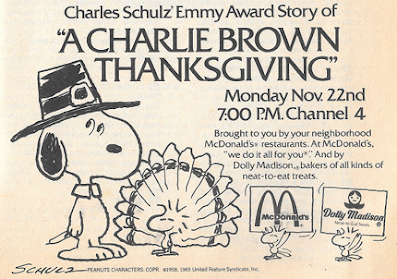 Arthur Hill's also on Little House on the Prairie Monday night (7:00 p.m., NBC). Little House wasn't a favorite in this house, though, so I probably was in my room doing homework. No Charlie Brown Thanksgiving* or Bugs Bunny and Daffy Duck in Carnival of the Animals, of course (starting at 7:00 p.m., CBS), and KCMT wouldn't pick up Monday Night Football unless the Minnesota Vikings were on, so you can forget the Baltimore Colts-Miami Dolphins game as well. (8:00 p.m., ABC) Instead, the TV-movie is The Savage Bees, with Ben Johnson and Michael Parks (8:00 p.m., NBC). Yep, homework.
Arthur Hill's also on Little House on the Prairie Monday night (7:00 p.m., NBC). Little House wasn't a favorite in this house, though, so I probably was in my room doing homework. No Charlie Brown Thanksgiving* or Bugs Bunny and Daffy Duck in Carnival of the Animals, of course (starting at 7:00 p.m., CBS), and KCMT wouldn't pick up Monday Night Football unless the Minnesota Vikings were on, so you can forget the Baltimore Colts-Miami Dolphins game as well. (8:00 p.m., ABC) Instead, the TV-movie is The Savage Bees, with Ben Johnson and Michael Parks (8:00 p.m., NBC). Yep, homework.*We have A Charlie Brown Thanksgiving on DVD, so we can watch it whenever we want. It's not the best of the Peanuts specials, though, so we don't usually watch it. Another case of irony, I suppose.
KTCA, the PBS affiliate in the Twin Cities, has a solid lineup on Tuesday; I don't know if KWCM carried it or not. One of the highlights is Mark Russell's post-election musical-comedy review (8:30 p.m.). Russell was one of the most astute, and funniest, political satirists around, an equal-opportunity humorist who puts someone like Art Buchwald to shame, and I thoroughly enjoyed watching his shows over the years until politics became too discouraging to be funny anymore. Anyway, I suspect Russell has a field day with Jimmy Carter's election; Carter always provided Russell with a lot of material. That's followed at 9:00 p.m. by Ingmar Bergman's magnificent The Seventh Seal. I probably wouldn't have watched that back then; I mean, I was precocious, but not that precocious, and besides, it would have run past my bedtime, but I own it today. No, if I watched anything, it would have been Police Woman (8:00 p.m., NBC). I don't think I'd watch it today, but you have to remember that back then I was a 16-year-old male, so you have to give me credit for that.
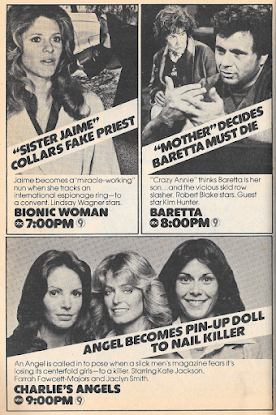 Wednesday night's NBC TV-movie is Irwin Allen's Flood, with Robert Culp, Martin Milner, Barbara Hershey, Teresa Wright, Carol Lynley, and Roddy McDowall (7:00 p.m.). There's a reason why NBC's TV-movies aren't usually remembered with the same affection and nostalgia as ABC's Movie of the Week, and maybe this is one reason why: "An overwhelming action-spectacle about an overwhelming disaster that swept through the lives—and revealed the lies—of a whole city!" I don't know; maybe it's really good! Or maybe those ABC movies weren't all that people remember them to be—remember, I didn't get to see them. Tonight is better-remembered for what wasn't available: The French Connection (8:00 p.m., CBS), which Judith Crist describes as "a milestone police-chase movie and a remarkable feat of filmmaking." The film, director William Friedkin, and star Gene Hackman all took home Oscars. And then there's Charlie's Angels (9:00 p.m., ABC; part of a big lineup that includes The Bionic Woman and Baretta): "Jill applies as a centerfold candidate for a girlie magazine that had its two previous centerfolds murdered." C'mon—Farrah Fawcett-Majors as a centerfold? I ask you, who's going to believe that?
Wednesday night's NBC TV-movie is Irwin Allen's Flood, with Robert Culp, Martin Milner, Barbara Hershey, Teresa Wright, Carol Lynley, and Roddy McDowall (7:00 p.m.). There's a reason why NBC's TV-movies aren't usually remembered with the same affection and nostalgia as ABC's Movie of the Week, and maybe this is one reason why: "An overwhelming action-spectacle about an overwhelming disaster that swept through the lives—and revealed the lies—of a whole city!" I don't know; maybe it's really good! Or maybe those ABC movies weren't all that people remember them to be—remember, I didn't get to see them. Tonight is better-remembered for what wasn't available: The French Connection (8:00 p.m., CBS), which Judith Crist describes as "a milestone police-chase movie and a remarkable feat of filmmaking." The film, director William Friedkin, and star Gene Hackman all took home Oscars. And then there's Charlie's Angels (9:00 p.m., ABC; part of a big lineup that includes The Bionic Woman and Baretta): "Jill applies as a centerfold candidate for a girlie magazine that had its two previous centerfolds murdered." C'mon—Farrah Fawcett-Majors as a centerfold? I ask you, who's going to believe that?Since you'll have to wait until Monday to read about Thanksgiving in detail—I'll have today's rant out of my system by then—I'll only point out that it was a very good day; the parade, football, turkey with all the trimmings. Nothing to complain about there, and who would want to complain, anyway? It's a day to be thankful for what you have, not dwell on what you don't have. (Still, you'll see that we missed a lot.)
And that brings us to Friday, the bonus day-off that's so great when you're a kid (and isn't bad when you're an adult, either, which might mean I haven't grown up yet). One of the big college football games of the year is the annual day-after-Thanksgiving* battle between Nebraska and Oklahoma, one that used to decide the Big 8 title each season. It's on ABC at 1:15 p.m. I had to listen to it on the radio, which I was able to swing by getting a fairly clear signal from a Nebraska radio station. The same applied to the nighttime half of the doubleheader, Penn State vs. Pittsburgh. (8:00 p.m.) It was harder finding a Pennsylvania radio station, but I was able to do it. Let's see; what else wasn't on? There's the animated adaptation of the beloved children's story Charlotte's Web (7:00 p.m., CBS), featuring the voices of Debbie Reynolds, Henry Gibson, Paul Lynde, Agnes Moorehead, and others (7:00 p.m, CBS). There's the All-Star Tribute to John Wayne (7:00 p.m., ABC), with appearances by Bob Hope, Angie Dickinson, Claire Trevor, Ron Howard, Lee Marvin, James Stewart, Sammy Davis Jr., Maureen O'Hara, and host Frank Sinatra. Plus. there are some great film clips There's the sequel to The French Connection, aptly titled The French Connection II (8:00 p.m., CBS) which still has Gene Hackman, but little else; Judith Crist says it's "not only resistible but repugnant, a botched, pointless and plodding film that thunks its way through detestable personalities and sadomasochistic details to an incredible ending." So I guess it was OK to miss it. Opposite that, KCMT offers The Lawrence Welk Show (6:30 p.m.), Chico and the Man (7:30 p.m.), The Rockford Files (8:00 p.m.), and Dean Martin's roast of Redd Foxx (9:00 p.m.). No evening that includes Jim Rockford can be all bad.
*One of the reasons ABC scheduled big games like this on the day following Thanksgiving was because of a little-known exception to the limit on how many times a team could appear on national television over a given period. Games played on days other than Saturday didn't count, as I recall, giving times like Nebraska and Oklahoma a bonus appearance.
Oh, and if we're talking about bad television, we should mention the MST3K alert: Plan Nine from Outer Space (Friday, 3:30 p.m., WCCO). "Space aliens enlist the aid of the dead in trying to conquer the universe." Bela Lugosi, Lyle Talbot, Vampira. It wasn't on MST3K, but the Rifftrax gang did this live a few years ago. It's widely considered one of the worst movies ever made; since I didn't see this in the WWT, perhaps the week was better than I thought!
l l l
OK—time to take a deep breath, step back, and pull myself together. Perhaps I got just a little carried away with that last bit. Let's take a look at what else there is in this week's issue.
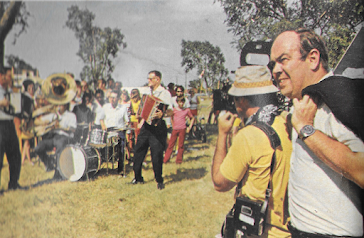 Doug Hill has a very nice article on Charles Kuralt—hopeful, even, for as he puts it, "Kuralt's reports from the church-supper, county-fair beat suggest that while journalism is crisis-ridden, America is not." That's an important message to hear; the country was going through a hard time in 1976, with the Cold War still strong, the wound from the Nixon resignation still fresh, and a very narrow presidential election just having concluded. Inflation, unemployment, and interest rates were all high, and morale was low. But as Kuralt points out, "I think that 'On the Road' should be irrelevant—uttterly. It serves to remind people that there are people besides politicians and entertainers and criminals [all one and the same, aren't they?] in the country." Kuralt has been doing his "On the Road" feature on the CBS Evening News since 1967; I always used to enjoy those whimsical pieces—back when we actually had CBS, of course. Now that we're in the WWT, where we don't get CBS—
Doug Hill has a very nice article on Charles Kuralt—hopeful, even, for as he puts it, "Kuralt's reports from the church-supper, county-fair beat suggest that while journalism is crisis-ridden, America is not." That's an important message to hear; the country was going through a hard time in 1976, with the Cold War still strong, the wound from the Nixon resignation still fresh, and a very narrow presidential election just having concluded. Inflation, unemployment, and interest rates were all high, and morale was low. But as Kuralt points out, "I think that 'On the Road' should be irrelevant—uttterly. It serves to remind people that there are people besides politicians and entertainers and criminals [all one and the same, aren't they?] in the country." Kuralt has been doing his "On the Road" feature on the CBS Evening News since 1967; I always used to enjoy those whimsical pieces—back when we actually had CBS, of course. Now that we're in the WWT, where we don't get CBS—No, wait, wait! Don't go there again! Get your mind off it, do you hear! (Takes deep breath.) Sorry about that. I don't know what came over me. Here's another look at what goes on behind the scenes: Frank Sean Swertlow's story on the "elite squad of New York's finest" delegated to keep TV stars out of trouble while doing location filming. "There are 15 police officers and four sergeants in the group," Swertlow writes, "with a lieutenant in charge. And one of the missions is to make sure all the production is done without inconveniencing millions of residents." One of those productions is Kojak, and the squad has its hands full—not just keeping the crowds away from Telly Savalas, but also keeping Telly away from them, especially the ladies. "Telly is a real ladies' man," says Lt. Paul Glanzman of the actor who headlines CBS's hit detective series—
A series I can't watch, right? Because it's not shown where I live! (Takes another deep breath.) I'm sorry again. I've really got to stop all this. It's not healthy, and it isn't doing anyone any good, especially me. Let's read about something more relaxing, funny even. Stephen Rubin talks to Beverly Sills and Carol Burnett about their holiday special at the Metropolitan Opera House on Thanksgiving night. They'd never worked together, or even met, until Burnett picked up the phone and asked Sills if she'd like to work with her on a special. The two clicked from the very beginning, and they make a delightful pair; "I'm having the time of my life," Beverly exclaims, while Carol "nearly fainted" when Sills told her she couldn't wait until they got started. Apparently the audience at the Met agreed, enthusiastically responding throughout the special, taped last March for . . CBS . . .
All right, that's it! I give up! You win, World's Worst Town™! Even though it's been 46 years, you still have the power to bring me to my knees! How you nearly ruined my adolescence, stunted my cultural growth, deprived me of some of the simple pleasures of life. No, I can't let it go! I need to see Dr. Raymer or Dr. Thompson from that ABC series Breaking Point. Wait, they wouldn't have shown that either! (Collapses sobbing, a broken man.)
l l l
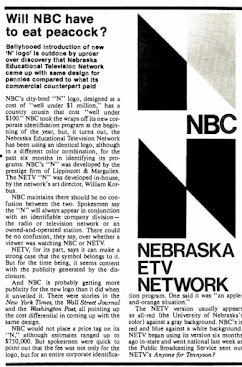 NBC's year got off to a bad startI feel much better now, thank you. What this little exercise accomplished, besides allowing me to vent my spleen, is the frustration that any TV connoisseur would have experienced during a week where most of the best programs were unavailable. With the exception of Sunday night (due to the NBC anniversary show), one could arguably claim that what NBC had to offer was inferior every night of the week. As evidence, I submit the list of
top-rated programs of 1976-77
; of the top 30 shows, NBC had only four, with one of those being Monday Night at the Movies and another being The Big Event, the umbrella title given to Sunday night specials from the World Series to, well, the NBC 50th anniversary show. The only two actual series to make the list were Little House on the Prairie and Sanford and Son; and KCMT, in its provincial way, preempted Sanford for Lawrence Welk.
NBC's year got off to a bad startI feel much better now, thank you. What this little exercise accomplished, besides allowing me to vent my spleen, is the frustration that any TV connoisseur would have experienced during a week where most of the best programs were unavailable. With the exception of Sunday night (due to the NBC anniversary show), one could arguably claim that what NBC had to offer was inferior every night of the week. As evidence, I submit the list of
top-rated programs of 1976-77
; of the top 30 shows, NBC had only four, with one of those being Monday Night at the Movies and another being The Big Event, the umbrella title given to Sunday night specials from the World Series to, well, the NBC 50th anniversary show. The only two actual series to make the list were Little House on the Prairie and Sanford and Son; and KCMT, in its provincial way, preempted Sanford for Lawrence Welk.In a way, I have only myself to blame for this, and in recognition of this, I can only throw myself on the mercy of the court—you, my readers. As I've said, I was already committed to television by then, and so the culture shock of moving to the World’s Worst Town™ would have affected anyone in my position. Had I grown up with only one television station, things might have been different. You could also argue that I attach too much importance to television, and you'd probably be right about that as well, but on the other hand, if not for that, you wouldn't be reading this now. (All right, that's a push.)
However, had there not been others like me, there wouldn't have been the push for cable television in rural areas. There wouldn't have been the evolution of pay-TV, the explosion of cable networks, the exponential increase in televised sports, the demand by the consumer for more choice. And that's what it all boils down to: choice. I'm not saying I would have watched all those shows on other networks, had I had the choice; it's that I didn't have the choice. And it's not as if I didn't know what I was missing, because thanks to TV Guide, I did know.
What's ironic about it, I guess, is that now, with more stations than ever to choose from, I hardly watch any current TV. The programs I do watch are mostly from the classic era, and some of them are shows I chose not to watch when they were originally on. Maybe I'm just not as dependent on TV as I used to be, and that's something I can truly be thankful for. TV
Published on November 19, 2022 05:00
November 18, 2022
Around the dial
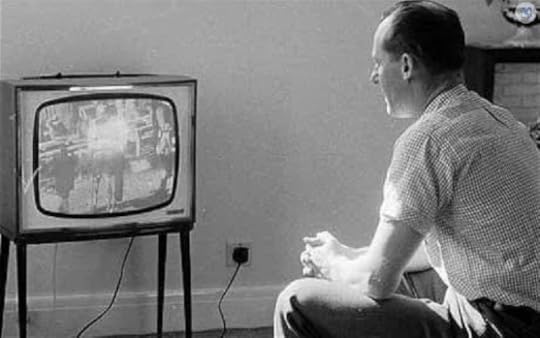
 Another easy week in the blogosphere; you'd almost think that people had other things to do besides type about old television shows. But you can't go wrong with a collection that includes a Thanksgiving recipe, right?
Another easy week in the blogosphere; you'd almost think that people had other things to do besides type about old television shows. But you can't go wrong with a collection that includes a Thanksgiving recipe, right?Helen Nielsen's third and final script for Alfred Hitchcock Presents was " You Can't Trust a Man ," a skillful adaptation of her own short story, starring Polly Bergen and Joe Maross; it's the subject of Jack's latest Hitchcock Project at bare-bones e-zine.
I submit that there's no way you're going to pass up a story that contains the line, "What on earth is going on with Shakespeare's tomb," am I right? That, and a lot of other interesting information, is contained in " Shakespeare's Tomb ," the latest documentary that John reviews at Cult TV Blog.
Pamelyn Ferdin was one of the most ubiquitous child stars on television in the 1960s and 1970s; as David points out at Comfort TV, she was never a regular but appeared in almost every series at one time or another. This week, read about some of her most notable roles.
Robert Clary , the last surviving member of the original cast of Hogan's Heroes (Kenneth Washington, who was in the last season, is still alive) died earlier this week, aged 96. He might be best-known for Hogan, but he was accomplished in many other roles as well. Terence remembers his career at A Shroud of Thoughts.
Did you know that Uncle Sam had a wife? Yes, Aunt Sammy! (The things you learn on the internet.) In 1931 the USDA and Aunt Sammy put out a collection of recipes from her radio program; the Broadcast Archives has her nifty recipe for roast turkey with chestnut stuffing . Just in time for next week! TV
Published on November 18, 2022 05:00
November 16, 2022
The It's About TV! Interview: Talking about The Gallant Men with Brandon Hollingsworth
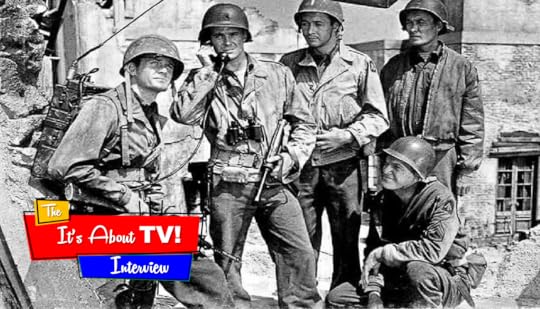
 As you probably know, I've done a lot of interviews since this website started. For the most part, I enjoy talking with people who expand my knowledge of the classic TV world: fellow authors, classic TV buffs, people who can tell me (and, by extension, you loyal readers out there) about shows that we should know more about. This week, The It's About TV! Interview presents Brandon Hollingsworth, as we discuss the 1962-63 World War II drama The Gallant Men. I think you'll enjoy our conversation.
As you probably know, I've done a lot of interviews since this website started. For the most part, I enjoy talking with people who expand my knowledge of the classic TV world: fellow authors, classic TV buffs, people who can tell me (and, by extension, you loyal readers out there) about shows that we should know more about. This week, The It's About TV! Interview presents Brandon Hollingsworth, as we discuss the 1962-63 World War II drama The Gallant Men. I think you'll enjoy our conversation.l l l
It’s About TV: Even classic TV fans might not be as familiar with The Gallent Men as they are with other period war dramas, and I’m thinking of shows like Combat! or Twelve-O’Clock High. Let’s start by talking a little about the premise of the series and its origins.
Brandon Hollingsworth: The Gallant Men is the story of a core group of eight men within the U.S. Army’s Fifth Division from the amphibious landings at Salerno in September 1943 to a point north of Naples in late spring 1944. The cast is a simplified cross-section of Army personnel in the fictional Able Company, led by Capt. Jim Benedict (played by the recently-deceased William Reynolds). Almost every episode is framed at the beginning and end by the narration of newspaper correspondent Conley Wright (Robert McQueeney), who was embedded with the company.
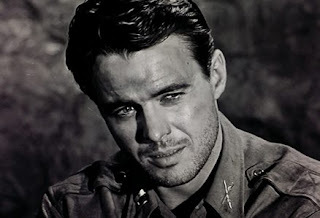 William Reynolds as Capt. Jim BenedictSeries creator William T. Orr had come up with the concept, under the working title Battle Zone, as early as 1957, but the Big Three networks weren’t interested. It took him until 1961 to sell the show to ABC. That network was looking for a varied programming slate in the fall of 1962 that it hoped would siphon viewers away from NBC and CBS. ABC was also the Warner Bros. TV division’s best customer, so there was a relationship that I think aided The Gallant Men in landing there.
William Reynolds as Capt. Jim BenedictSeries creator William T. Orr had come up with the concept, under the working title Battle Zone, as early as 1957, but the Big Three networks weren’t interested. It took him until 1961 to sell the show to ABC. That network was looking for a varied programming slate in the fall of 1962 that it hoped would siphon viewers away from NBC and CBS. ABC was also the Warner Bros. TV division’s best customer, so there was a relationship that I think aided The Gallant Men in landing there.There had been a couple of World War II dramatic series in the '50s. But the big thing was Westerns (a ship that was also launched by Orr, because he created Cheyenne in 1955; its success touched off the thirst for television Westerns). I know we’re talking about The Gallant Men, but focus group data collected in early 1962 for the Combat! pilot showed that kids and adults were favorably inclined toward a World War II drama. So I think by that time, a substantial number of people could handle a war show as an exercise in entertainment.
How did you first find out about The Gallant Men? It’s not as if the show is easy to find on TV.
My spouse got me interested in World War II, and with my interest in TV history, I naturally started wondering if there were small-screen depictions of the war before Band of Brothers. That's how I found Combat! In reading about Combat!, I kept seeing references to this "other" series that debuted the same season. I naturally got curious. But when I started searching for The Gallant Men online, I could find so little about it. The series doesn't live on YouTube, like Combat! and 12 O'Clock High, and it's not in current reruns on MeTV or Antenna or Decades. It didn't have detailed, dedicated fan sites. There was just hardly anything about it, and what was available was very incomplete. And if you're anything like me, when you're interested in something and find that it's hard to get to, it only increases your interest. So I got the DVD set in December 2019 and started from there.
Besides William Reynolds, who are some of the co-stars or guest stars who we'd recognize?
Roger Davis, who played radioman Roger Gibson, will immediately be recognized by Dark Shadows fans for his role as cursed portraitist Charles Delaware Tate. In 1972, he succeeded Pete Duel as Ben Murphy’s co-star in Alias Smith and Jones.
Robert Ridgely (Lt. Frank Kimbro) hit it off with Mel Brooks and ended up in amazingly silly bit roles in a few of Brooks’ films (a flasher in High Anxiety and an executioner in Robin Hood: Men in Tights, to name a couple). Ridgely also landed a number of bit parts in television series and had a long career in cartoon voice work. Once you know his face or his voice, you see (or hear) him all over the place.
Others from the regular cast turned up in one-off roles on other series, such as Perry Mason, the ubiquitous Westerns of the era, other Warner shows of the early ‘60s and the crime dramas of the ‘70s. Davis and Ridgely were definitely the biggest "successes," at least in terms of regular gigs, to come out of the principal cast.
Recognizable guest stars include William Windom, who later played Dr. Hazlett, the town doctor on Murder She Wrote; Julie Adams, who was in Creature From the Black Lagoon; Hans Gudegast, who would go on to play Dietrich, the antagonist in Rat Patrol; George O’Hanlon, who was the voice of George Jetson; Peter Breck; Robert Conrad; and three people who would become extremely well known in another context—DeForest Kelley, George Takei and James Doohan.
What role did the other men in the unit play with regard to the overall storytelling?
It really depended on the episode. While Gallant Men had better continuity than Combat!, it still aired well before the era of the show bible and airtight continuity, in which viewers really expect an ironclad universe and ample backstory. But there are some trends that generally hold true throughout the series.
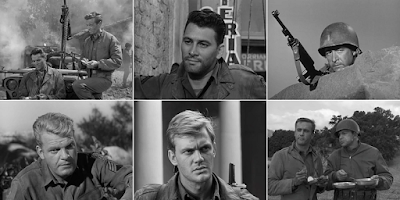 Upper row, left to right: Reynolds and McQueeney, Fontaine,
Upper row, left to right: Reynolds and McQueeney, Fontaine, Ridgely. Lower row: Slattery, Davis, Gothie and La Starza.Gibson is the youngest of the group and probably the least worldly. The other men of the unit typically tease him as they would a younger brother. He gets storylines about having to mature fast and to think differently in a combat zone to ensure his own survival. McKenna (Richard X. Slattery) is the by-the-book sergeant who has to learn to accept the validity of methods different than his own—which is hard for him. Hanson and Lucavich (Robert Gothie and Roland La Starza) are mostly there for comic relief. Kimbro is the character most likely to question the wisdom of the orders Able Company is given, or try to improvise if he feels like the orders he's given don't match reality and good sense.
D’Angelo (Eddie Fontaine) probably goes through the most of any regular character in the series. He’s shot, he’s captured, he accidentally shoots an old friend while on sentry duty, and he almost gets conned into losing his G.I. benefits to a prostitute. Generally, if something unfortunate is going to happen, it happens to D’Angelo.
A pattern that holds true through the series is that Capt. Benedict and Conley Wright form a strong but largely unspoken bond. Benedict, who normally keeps people at arm's length, confides in Wright more than anyone else. And though Wright is a reporter, not a GI, he's seen enough combat during the war that he can commiserate with the responsibilities, stress and grief that are inherent in Benedict's decisions and orders from farther up the chain. And of the principal characters, only Wright can usually get away with challenging or questioning Benedict, another indication of the trust and latitude present in that relationship.
How did the show compare to Combat!, which premiered the same season?
Combat! was grimmer and more naturalistic. At times, it felt more like a docudrama than a primetime network series. Orr acknowledged The Gallant Men had a fundamentally different aim, and many of its plots revolved around romance, psychology, and ethics away from the battlefield (one critic drily noted that Able Company must have arrived in Italy during a lull in the war, so few were the battle scenes).
Combat! very early on adopted its house look and tone: serious, long stretches without dialogue, lots of outdoor shooting. You can look at a Gallant Men episode and see most of it is filmed on indoor soundstages, and a few outdoor locations that appear again and again. It felt more like a standard weekly drama of the period (which reflects WB's assembly-line style of production). It's harder to suspend disbelief that these guys are in 1943 Italy when you notice they're on the same set you saw three episodes ago. Of course, it should be noted that Combat! frequently re-used outdoor shooting locations, something that became more and more obvious in later seasons.
One thing I find interesting is that, in the decades since these two shows were in first-run broadcast, an impression developed that somehow Combat! was the superior show and Gallant Men was an errant stepchild that deservedly got cancelled. Even Rick Jason (Combat's Lt. Hanley) hinted at that in his memoir, reinforcing the view. But I think a lot of that is assumption that ossified into accepted wisdom. The ratings and Q scores paint a different picture, one of more equal footing for these two freshman dramas that were each good, but in different ways.
It's worth noting that, for all the discussion about the pros and cons of these two dramas, both placed way behind McHale's Navy in the Nielsen ratings. Make of that what you will.
The Gallant Men was on the air while the Vietnam War was in its early days. Was there any attempt, a la M*A*S*H, to try and draw a parallel between what was going on in WWII and contemporary issues? I know that's probably not the case; the war had yet to become unpopular, and I don't think the show was the "social issues" type of program that you see with writers like Sterling Silliphant, but I'd be interested in your take.
You’re exactly right. The Gallant Men wasn’t so much a careful, incisive exploration of war so much as it was William T. Orr’s attempt to expand the Warner TV brand into war shows. There are glimpses of topics like PTSD and the stress of ceaseless combat duty. We get some taste of the difficulty of re-establishing government and order in towns turned to rubble. A couple of installments show us what war does to the frightened and weary civilians of the villages Able Company visits. But generally, there wasn’t the kind of clear social or moral message you would see on The Twilight Zone or Route 66.
About the closest I think the series comes to serious commentary is the episode “One Puka Puka,” in which a squad of our regulars encounters a group of Nisei from the 100th Infantry Battalion (a real unit from the Italian campaign, highly decorated and very well respected for their valor and actions). McKenna reveals he served at Pearl Harbor before the 1941 attack, and developed a strong distaste for Asians and Asian-Americans. The combined group has to defend itself against a German unit that sweeps in, and McKenna learns to trust and even embrace the unorthodox methods of the 100th Infantry guys. That episode aired in March 1963, when racism in the United States was really being challenged in education, law and politics. I feel like viewers would would see the parallel there.
What was the competition that the show faced from NBC and CBS? As far as you know, was ABC doing any kind of intentional programming to put it on when they did?
The competition was strong. ABC initially put The Gallant Men up against Rawhide on CBS (a top 25 show that season). In December 1962, ABC cancelled another of its freshman shows, a Roy Rogers-Dale Evans vehicle, and threw Gallant Men into its place on Saturday nights. And in that timeslot, the competition was even stiffer: Jackie Gleason on CBS (a top-20 show). NBC’s competing shows in the respective timeslots were the variety show International Showtime and legal drama Sam Benedict, neither of which was a real smash.
Those choices raise a question my research hasn’t totally answered yet: Did ABC put Gallant Men in those challenging timeslots because they believed in it, or because they didn’t? ABC's pre-premiere advertising expressed a hope for a broad audience. The leadoff spot on Friday night was considered a critical one to build an audience. The network further hoped Gallant Men would at least steal some viewers away from Rawhide. But the mid-season switch to Saturday nights frankly baffles me. It’s like the network started the season with a goal, then threw in the towel early and resorted to guessing. And, based on the trade publication reports, that inference may be a safe bet.
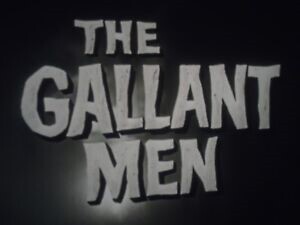 The Gallent Men runs for only one season, 26 episodes. Why do you think that was?
The Gallent Men runs for only one season, 26 episodes. Why do you think that was? You know, Bill Reynolds asked me the same question. Even he didn’t know why the show was cancelled! The show was no worse than any other drama running on TV at the time. Its Q scores, as I mentioned earlier, were pretty close to those of Combat! While ABC may have decided it was an underperformer, its ratings weren't awful. And Warners had commissioned at least a dozen scripts for additional episodes, indicating that they thought a second season was in the cards.
What I’ve gathered from contemporary accounts indicates the show was dropped because of politics between ABC and Warners. ABC had been WB television’s biggest customer, but the network seemed to lose its ardor for the studio during that ‘62 season, when the programming spaghetti it threw at the wall refused to stick. The TV division of Warners, meanwhile, entered a period of turmoil as it failed to sell new shows to the networks for the upcoming 1963-64 season.
Is there something that could have made the show more likely to be picked up for another season—say a better timeslot than Saturday against Jackie Gleason?
I think better relations between Warners and ABC and a stronger promotional push from the network would have helped. It's likely the show would have turned out a second season comparable in quality to the first, and then ABC could have made a better decision about its future based on the show’s own merits, not the network’s bad blood with the production company.
What did critics and viewers think of the show?
There were a couple of ways to measure viewer response. One was the Nielsen ratings. In November and December 1962, Gallant Men averaged 17.9—which means one in six TV-equipped homes in the U.S. were tuned to the show. That's an amazing success in our highly-fractured entertainment environment today, but back the Big Three days, 17.9 put The Gallant Men in the lower third of the primetime pack. But get this—it did succeed in drawing viewers away from Rawhide. Not enough to beat the Western, but an outcome that was in line with ABC's original goal.
The other way was Q scores, which purported to measure how much viewers personally liked a show. And by that measure, The Gallant Men did pretty well. In late 1962 and early '63, its Q scores were a couple points behind those of Combat! It consistently was among top ten primetime shows that season. But The Gallant Men's highest Q scores were among people 17 and younger, a demographic that may not have impressed ABC or potential advertisers.
Critical response to the show was mixed. The TV critic from the Atlanta Constitution praised it; Variety yawned, and said the show "might hang on." TV ratings prognosticator James Cornell predicted The Gallant Men would win its timeslot, based on the strength of the pilot episode. Toward the end of the season, he revised his view, opining that the succeeding episodes were weaker.
Over the years I've become a fan of the Warner Bros. series from the 1950s and 60s, particularly the P.I. and Westerns. Did The Gallant Men display any typical characteristics of WB shows, or was it more traditional? And in keeping with that, was William Reynolds the star of every episode, or did it focus on guest stars and/or other members of the cast?
To answer the last question first, each of the eight principal characters had at least one “focus” episode in which they played the central role. In a few of those, Capt. Benedict had only a peripheral role. Out of the 26 episodes produced, I’d say there was a good balance in giving the main cast something substantial to play. The guest stars usually had something interesting to do—and of course, were written out or “killed” by episode’s end to tie everything up.
I’m less familiar with the world of Warner Bros. television from this era than you, but in researching for the wiki, I noticed a lot of cross-pollination among the actors and crew. Names like actors Richard X. Slattery and William Reynolds, directors Charles R. Rondeau and Richard C. Sarafian, and writers Richard Landau and Don Tait appear in the credits lists for multiple Warners shows. If you were watching back then, you'd have noticed Reynolds, for instance, and thought to yourself, "Isn't that the guy from Pete Kelly's Blues and The Islanders?" both of which were also Warners shows. The writers had mostly turned in scripts for the private eye dramas and Westerns you referenced in your question. Lots of credits for Hawaiian Eye, Surfside 6, Cheyenne, and Maverick.
Is there a particular episode of the program that stands out for you?
"Retreat to Concord," the show's second episode, features Peter Breck as a master sniper who became embittered and misanthropic, essentially to protect his own mind, after watching nearly all his friends die in one horror after another. It's not a terribly original plot, but Breck does such a good job playing this damaged man that the hour becomes something of a standalone "play of the week" that you get wrapped up in. I won't spoil the rest of the plot, but if all 26 episodes had been as good as that one, the show might have had a better reputation.
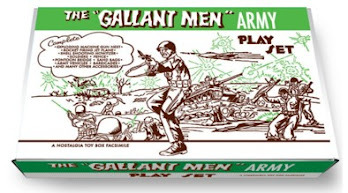
Is there a "message" that you think resonates from the show, or does it stand on entertainment and the performance of the actors?
I believe the show stands on its own entertainment value and the actors. Some of the folks who made Combat! said it was always an anti-war show (the same thing said about M*A*S*H a decade later), but I don’t sense that vibe from The Gallant Men. Nor was it a pro-war show. I think it’s a standard, but entertaining, melodrama set against the backdrop of the Italian campaign. Reading between the lines, it's fair to argue that plots of Gallant Men episodes point out there are some things that remain with us, even during the upheaval of war—there is romance, there is strife, there are interpersonal conflicts, and there are moments of levity.
This is also perhaps a good place to note that it wasn't just the writers, producers and directors determining what each episode would look and feel like. The show's technical advisor was Lt. Col. David Sisco, who had himself served in the Italian campaign. But Sisco wasn't just there to teach the actors how to shoot believably (though he did that as well); he had a veto power over storylines. So when he decided a particular plot didn't reflect well on the Army, he'd have it nixed, or some watered-down compromise would be written and shot. So while I mentioned a moment ago that the show wasn't explicitly pro-war, Sisco wanted to make sure it was in some way pro-Army.
Do you have any plans for writing a book? Because if you do, I’m buying it!
Kinda-sorta. What I've found is that if you're going to have a good reference book for any classic TV show, it's almost always up to the fans to research and write it. Someone like Douglas Brinkley isn't going to swoop in and do it. So my plan at the moment is to take what I've collected so far from period publications, notes drawn from the episodes themselves, databases such as IMDB, and material from the Warners archives at the University of Southern California, and write a concise history of the show and its context in the 1962-63 TV season. Something that I can make available in some way, so if a TV scholar or enthusiast of the future wants to learn about the show, they'll have somewhere to begin.
Incidentally, the Warners archives have been closed to researchers and the public for nearly three years. A finding aid indicates there's a lot to be mined there, so I can't really finish this putative mini-book until I can go through the USC holdings. And I'm very enthused about doing that.
You mentioned earlier that The Gallant Men doesn't live on retro channels—is it available anywhere right now?
My short answer is, it ought to be! But sadly, no. The only place one can find complete episodes is on the Warner Bros. whole-season DVD set. Copies can be found on eBay and Amazon.
One final question—the world has changed a lot since The Gallant Men; do you think there's a place for a war drama on television today? I suspect that WW2 and Korea would be too old to appeal to an audience, and we're probably now at that point for Vietnam as well. Is the Gulf War too divisive, or is there something that a series could teach us?
I might quibble just a bit with the idea that a WWII or Korean drama wouldn't find an audience. Saving Private Ryan, Band of Brothers, and The Pacific helped ignite an interest in the Second World War among people who were born long after the real thing ended. At the same time, those works really raised the bar for production values and scripting. I'm not sure a Combat! or a Gallant Men would necessarily succeed today, but if you wanted to produce a version of those shows with Band of Brothers production values, I think it could succeed on cable or on a streaming service. Like with every other television genre today, you have to reset your expectation of success; a much smaller audience is a hit these days, and I think a well-done war series could meet that mark.
The question of lessons is probably better directed to a philosopher or historian, but my personal view on the matter is that, from Combat! to Tour of Duty to Generation Kill, the message is pretty clear: war is bad, and even when fought for the "right reasons," it damages people and places in many ways. Yet we still make war. So the message isn't landing with the right people, I guess.
I don't think I'm wandering out on a limb to say it's harder for people to agree on what the lessons are, the closer in time we are to the event being depicted. There's so much information, and so many perspectives, that emerge only years after the last shot rings out. I think there's a reason The Gallant Men, M*A*S*H and Tour of Duty came out 20 years after the wars they depicted. It's also worth noting there's a nostalgia factor, particularly with WWII productions, and we're a long way from feeling romantic about Iraq and Afghanistan. I am curious whether that changes two decades from now, or ever.
l l l
 Brandon HollinsworthThat was fun! I want to thank Brandon for such an enjoyable time talking about The Gallant Men, which has moved higher up on my wish list. (And I want to know when that book comes out!) If you're appetite for the show has been whetted, I encourage you to visit
this Fandom.com page
and episode guide, which Brandon did a great job in creating.
Brandon HollinsworthThat was fun! I want to thank Brandon for such an enjoyable time talking about The Gallant Men, which has moved higher up on my wish list. (And I want to know when that book comes out!) If you're appetite for the show has been whetted, I encourage you to visit
this Fandom.com page
and episode guide, which Brandon did a great job in creating. And also a big thanks to one of my partners in crime, my ol' buddy Jodie Peeler, who put Brandon and me in touch—thanks for always looking out for us! TV
This interview has been lightly edited for clarity.
Published on November 16, 2022 05:00
November 14, 2022
What's on TV? Thursday, November 18, 1954

 Art Linkletter's guest on today's House Party (1:30 p.m., CBS) is the legendary film director Mack Sennett, creator of the Keystone Kops, models for many of today's world governments. He worked with many of the biggest names in Hollywood, and his contributions to the film industry earned him an honorary academy Award in 1938. Although he'd been retired for nearly 20 years, he'd appeared on This is Your Life with Ralph Edwards earlier in the year. Kind of cool to think that as early as 1954, TV could bring you a piece of nostalgia. The listings are from Chicagoland.
Art Linkletter's guest on today's House Party (1:30 p.m., CBS) is the legendary film director Mack Sennett, creator of the Keystone Kops, models for many of today's world governments. He worked with many of the biggest names in Hollywood, and his contributions to the film industry earned him an honorary academy Award in 1938. Although he'd been retired for nearly 20 years, he'd appeared on This is Your Life with Ralph Edwards earlier in the year. Kind of cool to think that as early as 1954, TV could bring you a piece of nostalgia. The listings are from Chicagoland.-2- WBBM (CBS) MORNING 6:40 Today’s Thoughts 6:45 Farm Daily—Menard 7:00 Morning Show—Jack Paar 9:00 Garry Moore—Variety 9:30 Godfrey And Friends Guest host: Peter Lind Hayes 10:30 Strike It Rich—Quiz 11:00 Valiant Lady—Serial 11:15 Love of Life—Serial 11:30 Search For Tomorrow 11:45 Guiding Light—Serial AFTERNOON 12:00 Portia Faces Life—Serial 12:15 The Seeking Heart—Serial 12:30 Welcome Travelers 1:00 Robert Q. Lewis—Variety 1:30 Linkletter’s House Party Guest: Mack Sennett 2:00 Big Payoff—Quiz Game 2:30 Bob Crosby—Music 3:00 Brighter Day—Serial 3:15 Secret Storm—Serial 3:30 On Your Account—Quiz 4:00 Shopping With Miss Lee 4:15 U.N. In Action—Discussion 4:30 Looking Forward—Talks 5:00 Range Riders—Adventure 5:30 Gene Autry—Western EVENING 6:00 Sports—Bob Elson 6:15 News—Julian Bentley 6:30 News—Douglas Edwards 6:45 Jane Froman Show—Music 7:00 RAY MILLAND SHOW 7:30 SHOWER OF STARS Stars: Betty Grable, Harry James, Eddie Mayehoff, Danny Thomas, James Dunn, Michael O’Shea, Bill Bishop 8:30 FOUR STAR PLAYHOUSE “My Own Dear Dragon” 9:00 PUBLIC DEFENDER—Drama 9:30 NAME THAT TUNE—Quiz 10:00 NEWS AND WEATHER 10:15 IN TOWN TONIGHT 10:30 NEWS—John Harrington 10:45 KUP’S SHOW—Irv Kupcinet 11:00 Playhouse—Drama 11:30 Football This Week—News 11:45 Late News 11:50 MOVIE—Espionage “Secret of the Underground”
4 WTMJ (MILWAUKEE) (NBC) MORNING 7:00 Today—Dave Garroway 9:00 Ding Dong School 9:30 A Time To Live—Serial 9:45 Three Steps To Heaven 10:00 Home—Women’s News 11:00 What’s New In The Kitchen 11:45 Let’s Look At The News AFTERNOON 12:00 Hot Shot Review—Music 12:30 Weather—Bill Carlsen 12:35 Bob Heiss—Interviews 1:30 Beulah Donohue—Women 2:00 Greatest Gift—Serial 2:15 Golden Windows—Serial 2:30 One Man’s Family 2:45 Miss Marlowe—Serial 3:00 Hawkins Falls—Serial 3:15 First Love—Serial 3:30 World Of Mr. Sweeney 3:45 Modern Romances 4:00 Gretchen Colnik—Tips 4:15 Little Amateurs—Talent 4:30 Howdy Doody—Puppets 5:00 Foreman Tom—Western 5:45 Let’s Look At The News 5:55 Weather—Bill Carlsen EVENING 6:00 Sports—Larry Clark 6:15 Zeb Billings—Music 6:30 Dinah Shore—Music 6:45 News—John Cameron Swayze 7:00 GROUCHO MARX—Quiz 7:30 JUSTICE—Legal Cases “Express to Disaster” 8:00 DRAGNET—Jack Webb 8:30 FORD THEATRE—Drama COLOR “Summer Memory” 9:00 NEIGHBOR THEATER 9:30 TRIANGLE THEATER—Drama 10:00 WEATHER—Bill Carlsen 10:05 PLAYHOUSE 15—Drama 10:20 LET’S LOOK AT THE NEWS 10:30 MR. DISTRICT ATTORNEY 11:00 Tonight—Variety 12:00 News at Midnight 12:05 MOVIE—Mystery “The Mysterious Miss X”
-5- WNBQ (NBC) MORNING 6:45 Everett Mitchell—Talks 7:00 Today—Dave Garroway 9:00 Ding Dong School 9:30 A Time To Live—Serial 9:45 Three Steps To Heaven 10:00 Home—Women’s News 11:00 Betty White Show 11:30 Feather Your Next—Quiz AFTERNOON 12:00 Noontime Comics 12:30 Bob & Kay Show—Chats 1:00 Home Cooking—Recipes 1:30 Melody Magazine—Music 2:00 Greatest Gift—Serial 2:15 Golden Windows—Serial 2:30 One Man’s Family 2:45 Miss Marlowe—Serial 3:00 Hawkins Falls—Serial 3:15 First Love—Serial 3:30 World Of Mr. Sweeney 3:45 Modern Romances 4:00 Pinky Lee—Comedy, Games 4:30 Howdy Doody—Puppets 5:00 Elmer The Elephant—Kids 5:30 Close-Up—Music EVENING 6:00 Weather—Clint Youle 6:05 News—Jack Angell 6:10 Sports—Joe Wilson 6:15 Dorsey Connors—Travel 6:20 Alex Dreier—Features 6:25 Tony Weitzel—Comments 6:30 Dinah Shore—Music 6:45 News—John Cameron Swayze 7:00 GROUCHO MARX—Quiz 7:30 JUSTICE—Legal Cases “Express to Disaster” 8:00 DRAGNET—Jack Webb 8:30 FORD THEATRE—Drama COLOR “Summer Memory” 9:00 VIDEO THEATER—Drama “The Captive City” 10:00 WEATHER—Clint Youle 10:10 DORSEY CONNORS—Ideas 10:15 NEWS—Jack Angell 10:30 SPORTS—Norman Barry 10:45 HERBIE MINTZ—Music 11:00 Tonight—Variety 12:00 MOVIE—Comedy “Girl From Havana”
-7- WBKB (ABC) MORNING 7:00 Chicago Parade—Variety 8:00 Breakfast Club—McNeil 9:00 Women And The World 9:30 Play House—Kiddies 10:00 Creative Cookery—Recipes 10:55 News—Ulmer Turner 11:00 Danny O’Neil Show 11:55 News—Ulmer Turner AFTERNOON 12:00 Happy Pirates—Kids’ Fun 12:55 News—Ulmer Turner 1:00 Ruth Crowley—Baby Care 1:15 TV Dental Care 1:30 The Tom Duggan Show 2:30 Double Feature—Films 1. “The Honeymoon” 2. “The Loosers” 3:30 News—Ulmer Turner 3:35 Time For Uncle Win—Kids 4:00 Pied Piper—Kids 4:30 Garfield Goose And Friend 5:00 Santa’s North Pole Review 5:30 Jungle Adventure “The Money Safari” Part 1 5:45 News—Austin Kiplinger 5:50 Sports—Jack Drees 5:55 Weather—Wayne Griffin EVENING 6:00 Kukla, Fran, And Ollie 6:15 News—John Daly 6:30 Lone Ranger—Western 7:00 THE MAIL STORY—Drama 7:30 TREASURY MEN IN ACTION 8:00 WANT TO LEAD A BAND? 8:30 KRAFT THEATRE—Drama “My Son, the Doctor” 9:30 VICTORY AT SEA—Documentary 10:00 PLAYHOUSE—Film Drama 10:30 MY HERO—Comedy 11:00 News—Ulmer Turner 11:05 Weather—Wayne Griffin 11:10 Tom Duggan—Comments 12:00 Audition—Talent Show
-9- WGN (Du Mont) MORNING 9:00 Paul Fogarty—Exercises 9:30 The Femme Show—Women 10:00 Hi Ladies—Mike Douglas 10:55 News—Steve Fentress 11:00 The Romper Room—Kids Miss Rosemary 11:55 News—Steve Fentress AFTERNOON 12:00 Best Of The West—Kids 12:55 News—Steve Fentress 1:00 King’s Crossroads—Film 1:30 Learning Brings Adventure 2:00 Paul Dixon—Music 3:00 MOVIE—Western “Timber Terrors” 4:00 MOVIE—Feature Film 4:45 Cinnamon Bear—Kiddies 5:00 Bob Atcher Show—Western 5:30 News—Leslie Monypenny 5:45 Curbstone Cut Up—Chats EVENING 6:00 Captain Video—Adventures 6:15 Sports Final—Vince Lloyd 6:30 News—Spencer Allen 6:45 Chicagoland Newsreel 7:00 THEY STAND ACCUSED 8:00 BEHOLD THY MOTHER 9:00 THE LONE WOLF—Action 9:30 BOSTON BLACKIE—Drama 10:00 MOVIE—Drama “Summer Storm” 11:30 News—Les Nichols 11:45 Weather—Carl Greyson
TV
Published on November 14, 2022 05:00
November 12, 2022
This week in TV Guide: November 13, 1954
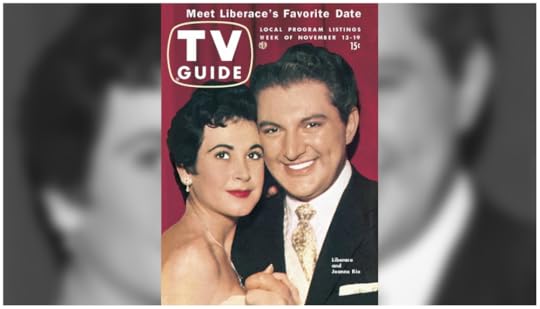
 I trust that by now most of you know me well enough to understand that the only time I recycle a TV Guide story is when I don't have an issue for that week (hey, it happens!) and that, even then, I try to introduce something new to what I've written. I'll admit there are times, though, when I'm tempted to dip into the archives anyway, either because I'm short of time or simply unmotivated by an issue that doesn't seem to say much. (There's also laziness, but we'll let that pass.) And then I'll run across the hook, that one thing that jumpstarts everything else, and after that it all falls into place.
I trust that by now most of you know me well enough to understand that the only time I recycle a TV Guide story is when I don't have an issue for that week (hey, it happens!) and that, even then, I try to introduce something new to what I've written. I'll admit there are times, though, when I'm tempted to dip into the archives anyway, either because I'm short of time or simply unmotivated by an issue that doesn't seem to say much. (There's also laziness, but we'll let that pass.) And then I'll run across the hook, that one thing that jumpstarts everything else, and after that it all falls into place. For example, if you know your history, you're bound to notice a line (no pun intended) in Sunday's listing for What's My Line? (9:30 p.m. CT, CBS) that leaps out. Following the usual boilerplate ("John Daly moderates for panelists Arlene Francis, Dorothy Kilgallen, Bennett Cerf") the magazine, as it often does, adds a promo for an article elsewhere in the issue: "The panelist covers a murder trial in Cleveland, page 18."
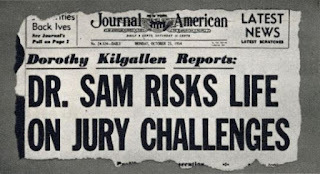 For many years, the 1954 murder trial of Dr. Sam Sheppard was considered the most famous American murder trial of the 20th century, if not all the nation's history; it certainly was the most widely reported. The accused, Dr. Sam, was a neurosurgeon from a prominent medical family in Cleveland. His wife, Marilyn, was found bludgeoned to death the morning of July 4, 1954, along with her unborn child, in the upstairs bedroom. Sheppard claimed that she had been murdered by a "bushy-haired intruder" whom he had tried and failed to fight off. The prosecution claimed Sheppard had done it himself because of an adulterous affair he was having with a nurse at his hospital. Now, he's on trial for his life.
For many years, the 1954 murder trial of Dr. Sam Sheppard was considered the most famous American murder trial of the 20th century, if not all the nation's history; it certainly was the most widely reported. The accused, Dr. Sam, was a neurosurgeon from a prominent medical family in Cleveland. His wife, Marilyn, was found bludgeoned to death the morning of July 4, 1954, along with her unborn child, in the upstairs bedroom. Sheppard claimed that she had been murdered by a "bushy-haired intruder" whom he had tried and failed to fight off. The prosecution claimed Sheppard had done it himself because of an adulterous affair he was having with a nurse at his hospital. Now, he's on trial for his life.The Sheppard case had, Dorothy Kilgallen would say, "'[a]ll the ingredients of what in [the] newspaper business we call a good murder. It has a very attractive victim, who was pregnant, and the accused is a very important member of the community, respectable, [a] very attractive man. Then added to that, you have the fact that it is a mystery as to who did it." Reporters converged on Cleveland from around the country and even from Europe, and the story dominated the local newspapers.
Dorothy Kilgallen is no stranger to the crime beat; although known primarily for her Broadway column, her appearances as a regular panelist on WML, and her daily radio show with her husband, Dick Kollmar, she's also a respected journalist (as was her father), a crime reporter (a regular at the biggest murder trials, some of which she reviewed in her posthumously published book, Murder One), and confidant of politicians and celebrities alike. And she knows how to cover a story, which is why she's in Cleveland, representing the Hearst newspapers.
Even before the start of the trial, Dorothy's made her presence felt. During jury selection, one prospect was dismissed for discussing the trial with a friend; she explained the friend had asked her if she'd gotten Dorothy's autograph. (Dorothy sent a note to the dismissed juror: "Dear Betty, the reporters thought you would have made a good juror.") She was even invited to meet with trial judge Edward Blythin in his chambers; the judge told her that he and his wife enjoy her on TV, and later said, "I can understand why she is so popular." She doesn't mind the publicity; "I've been working hard since I was 17 years old to get where I am now, and although the attention slows me down, I am grateful to give autographs."
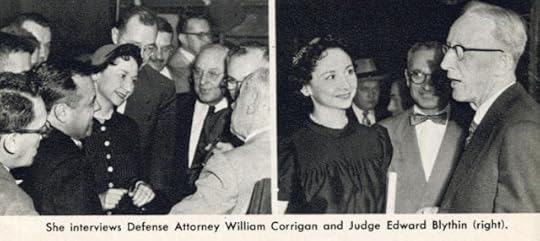
Just because she's covering the Trial of the Century, though, doesn't mean she's quitting her weekend job. She arrives in Cleveland at 4:00 a.m. Monday morning after appearing on WML, is in bed in the hotel by 5, up at 8, and at the courthouse at 9:45. She then flies back to New York to spend the evening with her family, gets up at 5:30 Tuesday morning to record two sessions of their radio show, and is back in Cleveland and at the courthouse by noon. When she's not travelling, she pounds out her daily "Voice of Broadway" column. Oh, and she also covers the trial.
And now, as Paul Harvey would say, the rest of the story. You remember that quote from Dorothy, the one about this being a "good murder"? She made that comment to Judge Blythin in his chambers, when he asked her what brought her to Cleveland; he couldn't understand why such well-known newspeople as Bob Considine, Theo Wilson, and Marguerite Parton were covering the trial. That's when she said, "it is a mystery as to who did it."
"Mystery?" Blythin replied, "It's an open and shut case."
"Well, what do you mean, Judge Blythin?" she asked, stunned.
He answered, "Well, he is guilty as hell. There is no question about it."
She didn't reveal this story at the time, or for many years afterward; she felt she was not at liberty to do so, she explained, since the conversation was off the record. Sheppard was found guilty of second-degree murder on December 21 after a 9-week trial (a verdict with which Kilgallen was outraged; as a result, her column was dropped by Cleveland newspapers) and was sentenced by Blythin to life in prison. Blythin died in 1958, and in 1964 Kilgallen casually mentioned her conversation with him at an event attended by Sheppard's new lawyer, F. Lee Bailey. Bailey got her testimony in a deposition in May , and included it in his appeal. A judge overturned Sheppard's conviction in July on grounds of pre-trial publicity and judicial prejudice; that decision was upheld in a landmark Supreme Court ruling in 1966, which ordered a new trial. Sheppard was retried in October, 1966, in the same courthouse in which he had been convicted 12 years earlier, and was acquitted. He died in 1970. A 1975 TV-movie was made about the case; I wrote about that here.
By the time of Dr. Sam's retrial, Dorothy Kilgallen, who had so criticized the verdict and whose deposition played a role in the overturning of Sheppard's conviction, had been dead for a year, apparently of an accidental overdose. She had covered Jack Ruby's 1964 murder trial in Dallas and had interviewed Ruby, and she was skeptical of the Warren Report' conclusions regarding the assassination of John F. Kennedy. There are many to this day who think her death was murder and was related to her investigation into the assassination.
l l l
Well, if I can't build on that, I should probably just wrap it up, and judging by the number of lines you see below this one, it's probably apparent to you that I've decided to keep going, perhaps to my detriment. (You'll be the judge of that.) Two of America's most successful comics have also decided to keep going, and according to this week's joint review (probably written by Dan Jenkins), it may be detrimental to them as well.
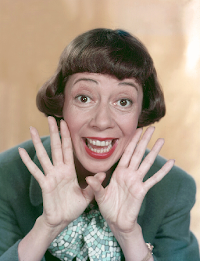 For five seasons, one of the Golden Age's shining moments was Your Show of Shows, starring Sid Caesar and Imogene Coca. Then they split up, choosing to go their separate ways (as did their director, Max Liebman). Everyone agrees that the three of them, separate, are less than the sum of their parts; unfortunately, the one who seems to have suffered the most is Coca. (Saturday, 8:00 p.m., NBC)
For five seasons, one of the Golden Age's shining moments was Your Show of Shows, starring Sid Caesar and Imogene Coca. Then they split up, choosing to go their separate ways (as did their director, Max Liebman). Everyone agrees that the three of them, separate, are less than the sum of their parts; unfortunately, the one who seems to have suffered the most is Coca. (Saturday, 8:00 p.m., NBC)Part of the challenge for Coca, Jenkins says, is that she is "a performer who must be given an idea, rather than a script; a direction, rather than set lines." After five years, she's exhausted the bits from her nightclub act, and "everyone has seen her several times more than once"; she also "appears to have run out of writers who know what to do what her gamin-like qualities." That's not to say that every sketch is a dud; she has excelled in some of them, but too often they run too long. And as everyone knows, "Brevity is still the soul of wit."
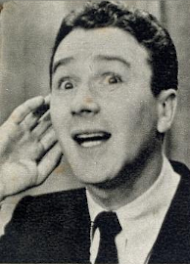 Our other star under the gun is Red Buttons, who in the off-season moved from CBS to NBC, from Monday nights to Friday nights (7:00 p.m.), and from one writing staff to another. But, says Jenkins, "he is still Red Buttons. If one is an aficionado, he is the greatest. Otherwise . . ."
Our other star under the gun is Red Buttons, who in the off-season moved from CBS to NBC, from Monday nights to Friday nights (7:00 p.m.), and from one writing staff to another. But, says Jenkins, "he is still Red Buttons. If one is an aficionado, he is the greatest. Otherwise . . ."The problem is that Buttons "has no comic traits peculiar to him alone. He is not funny per se. A Jack Benny can be hilarious just standing with his arms folded, staring at an old lady in the front row. Buttons can't. He needs material." And Red's writers, "whose numbers must by now be as forlorn as they are legion," can only recycle old bits. Television is a demanding medium, one that demands staying power, "a basic talent which can rise above material and carry its own weight on off-weeks." So far, Red "has displayed very little of it."
l l l
Is there anything interesting to report from the industry? Well, here's something; at the Hollywood Teletype, Dan Jenkins reports that "New, young CBS comic Johnny Carson will replace Jack Paar for several weeks in January." That would be Paar's weekday morning show, which airs at 7:00 a.m. on CBS. It won't be the last time; Johnny takes Jack's place again in 1962, this time permanently. As I recall, that turns out pretty well.
The first reports are in on how television covered the 1954 midterm elections, and it's described as "generally creditable," which is probably better that what we just had. NBC pulled off something of a technical coup, with a four-way split screen discussion between their commentators in New York, D.C., Chicago, and Los Angeles. And here's something: since WRCA in New York broadcasts in color (it's the NBC affiliate, now known as WNBC), it asked the parties what they'd like for their "official TV color." The Democrats choose green, the Republicans blue. Red, of course, would have been unthinkable for either party given the Cold War.
And remember how I wrote about how companies get involved with the shows they sponsor? It seems that the Campbell Soup Company, which sponsors the sitcom Dear Phoebe on NBC, doesn't like canned laughter. Therefore, they've ordered the laugh track deleted from the show. Now, that's the kind of sponsor interference I can get behind.
l l l
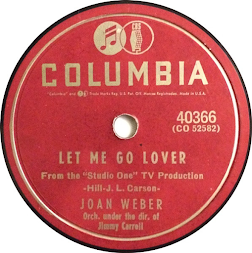 Here's another one of those stories that jumps off the page. I must have read Brooks and Marsh's Complete Director to Prime-Time Network TV Shows from cover to cover when it first came out in 1979, and one of the things that stuck with me for some reason was an anecdote about an episode of CBS's Studio One—the episode that's on this Monday night at 9:00 p.m., as it happens. It's called "Let Me Go, Lover," a drama about murder and corruption in the record industry, and since producer Felix Jackson needed a song, he went to Mitch Miller, head of recording for CBS's subsidiary, Columbia Records. "Miller gave [Jackson] an obscure ballad called 'Let Me Go, Devil,' and urged that it be sung on the soundtrack by an unknown songstress rather than by an established star, in order to heighten the dramatic impact. With remarkable foresight he then saw to it that, prior to the telecast, record stores were well stocked with her Columbia recording of the song."
Here's another one of those stories that jumps off the page. I must have read Brooks and Marsh's Complete Director to Prime-Time Network TV Shows from cover to cover when it first came out in 1979, and one of the things that stuck with me for some reason was an anecdote about an episode of CBS's Studio One—the episode that's on this Monday night at 9:00 p.m., as it happens. It's called "Let Me Go, Lover," a drama about murder and corruption in the record industry, and since producer Felix Jackson needed a song, he went to Mitch Miller, head of recording for CBS's subsidiary, Columbia Records. "Miller gave [Jackson] an obscure ballad called 'Let Me Go, Devil,' and urged that it be sung on the soundtrack by an unknown songstress rather than by an established star, in order to heighten the dramatic impact. With remarkable foresight he then saw to it that, prior to the telecast, record stores were well stocked with her Columbia recording of the song."The song, sung by Joan Weber, was renamed, "Let Me Go, Lover" to match the title, and was used throughout the story. The next morning, "record stores were deluged with customers wanting 'that song that was on TV last night'—and 'Let Me Go, Lover' became a phenomenal hit," selling a half-million copies in the next five days (it eventually became a million-seller) and hit #1 on the Billboard charts. Mitch Miller knew what he was doing, which is why he was the success he was, and after more than 40 years, I've finally gotten to use that anecdote.
What else is on? There's Orson Welles' noirish version of Macbeth (Sunday, noon, WTMJ), with Welles in the title role, plus Jeanette Nolan, Dan O'Herlihy, Roddy McDowall, and Alan Napier in a non-Alfred role as "A Holy Father." Also on Sunday afternoon, Hallmark Hall of Fame presents "A Matter of Principle," the story of how John Adams defended the British soldiers accused of the Boston Massacre (4:00 p.m., NBC).
The latest NBC color spectacular is the Pulitzer Prize-winning romantic comedy "State of the Union," on Producer's Showcase (Monday, 7:00 p.m.), with Joseph Cotten and Margaret Sullivan in the roles previously played on the big screen by Spencer Tracy and Katharine Hepburn. Wednesday's highlight is the World Lightweight Championship fight between champion Paddy DeMarco and challenger Jimmy Carter (no, not that one), from the Cow Palace in San Francisco (9:00 p.m., CBS). Carter, who lost the title to DeMarco in March, regains it with a TKO in the 15th round. And on Thursday, CBS presents its own spectacular, as Shower of Stars uses Betty Grable, Harry James, and other stars in sketches about entertainers traveling from gig to gig. The sponsor, incidentally, is Chrysler. Coincidence?
Before I forget, The Liberace Show airs on Wednesday at 9:30 on WBKB, and the young lady on the cover of this week's issue is Liberace's latest squeeze (pronounced "beard"), Joanne Rio, a struggling young actress who's described as "the only girl he takes home to mother." Despite the headline in one article entitled "Liberace Fiancee Tells of First Kiss," she denies that the couple are engaged, saying that "We just enjoy each other's company, that's all."
l l l
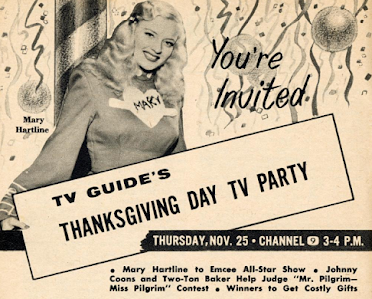 Finally, we'll be celebrating Thanksgiving next week with an appropriate issue, but in the meantime, the deadline is at hand to order tickets for TV Guide's Thanksgiving Day TV Party, which takes place live on WGN from 3 to 4:00 p.m. on Thursday, November 25. The tickets are free for both kids and adults, and all kids receive a free gift package.
Finally, we'll be celebrating Thanksgiving next week with an appropriate issue, but in the meantime, the deadline is at hand to order tickets for TV Guide's Thanksgiving Day TV Party, which takes place live on WGN from 3 to 4:00 p.m. on Thursday, November 25. The tickets are free for both kids and adults, and all kids receive a free gift package.The show will be hosted by Super Circus star Mary Hartline and features the top Chicagoland TV children's favorites: Uncle Johnny Coons; John Conrad and Elmer the Elephant; "Pied Piper" Art Hern; Two-Ton Baker, the Happy Pirate; singing cowboy Bob Atcher; and Romper Room's Miss Rosemary. There's also a contest to select two lucky kids as "Mr. Pilgrim" and "Miss Pilgrim," and in addition to appearing on the show, the lucky boy and girl each get this impressive haul of prizes:A 21-inch Sentinel table model television set.A genuine Schwinn Hornet bicycle, complete with horn, headlights and all features.A pedigreed cocker spaniel puppy and a month's supply of Rival Dog Food.A handsome 21-jewel Lady or Lord Elgin wrist watch.Those kids are making out like bandits, aren't they? I wonder how many hundreds of them were begging their parents to let them send in their names and photos? I wonder how many parents were trading side glances about the dog? And I wonder how much the tax added up to for the winners?
Anyway, it sounds like a lot of fun, doesn't it? This whole idea of a Thanksgiving TV party, with celebrities from all the local stations—not quite like a family get-together, but something special. I know other stations did things like this, for Thanksgiving or Christmas. Of course, without local kids' shows, I don't suppose you'd see anything like it today. But then, sometimes it doesn't seem as if we have as much fun today, either. TV
Published on November 12, 2022 05:00
November 11, 2022
Around the dial
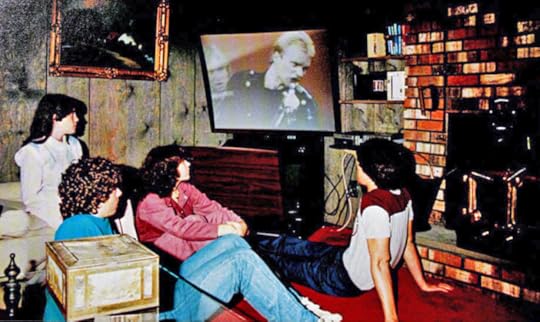
 Today is Veterans Day, and I'd be remiss if I didn't start out with recognition for all those serving in the Armed Forces, here and elsewhere. There's no jingoism needed to thank them for their service.
Today is Veterans Day, and I'd be remiss if I didn't start out with recognition for all those serving in the Armed Forces, here and elsewhere. There's no jingoism needed to thank them for their service.Now, for this week. There are many jokes out there about associating size with quality, and I think it would be right and proper to pass on all of them now. I'll just say that even though we have a smaller set of links to share this week, the quality more than makes up for the quantity.
Earlier this week, HBO celebrated its 50th birthday. For several years, HBO was cable TV, at least as far as many people were concerned, and to this day the network has a place at the highest level of broadcasting. At The Ringer, Alison Herman looks at how it's come a long way during those years and how it keeps overcoming the obstacles.
It's been a long time since I checked out GSN, the Game Show Network. So long, in fact, that the last shows I watched there were What's My Line?, Password, and PlayMania (for obvious reasons). The Flaming Nose brings us up to date with this review of one of its most popular shows, America Says , with host John Michael Higgins.
The Broadcasting Archives links to a Washington Post story by John Kelly on the catchy music that punctuated late-night movies back in the 1950s. The best-known of these is " The Syncopated Clock " by Leroy Anderson, but there are others you'll probably recognize in this charming look back.
John is back at Cult TV Blog with another documentary review, this time a 2015 look at Manchester's Strangeways Prison and its infamous 1990 riot . The story is interesting, the techniques used in the documentary are interesting; read all about it.
I do link to Terence at A Shroud of Thoughts for other than obituaries, but he's always on top of things, and he does them so well—the way they should be done. He has several this week that deserve your attention: Andrew Prine , Leslie Jordan , Ron Masak , and Jules Bass . Champions all.
A pretty good week at that, right? As I said, size isn't everything. TV
Published on November 11, 2022 05:00
November 9, 2022
What I've been watching: October, 2022
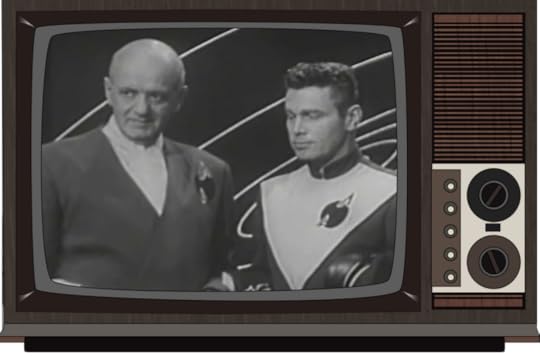
Shows I’ve Watched:Shows Next on the List:Rocky Jones, Space RangerCombat!Surfside 6MaverickCheyenne
 It's often said that the appeal of classic television, at least in part, is due to the desire to recapture the sense of one's youth, whether it be childhood, college years, or some other significant memory. Watching the show takes you back to that time and causes you to release positive endorphins or whatever it is that's supposed to give you that warm feeling all over. And while there's undoubtedly truth to that, I think that explanation tends to be too easy. It doesn't account for the vagaries of human emotions, the environment in which one grows up, the—oh hell, why don't we just admit that everyone's different, and there's no accounting for taste, good or bad.
It's often said that the appeal of classic television, at least in part, is due to the desire to recapture the sense of one's youth, whether it be childhood, college years, or some other significant memory. Watching the show takes you back to that time and causes you to release positive endorphins or whatever it is that's supposed to give you that warm feeling all over. And while there's undoubtedly truth to that, I think that explanation tends to be too easy. It doesn't account for the vagaries of human emotions, the environment in which one grows up, the—oh hell, why don't we just admit that everyone's different, and there's no accounting for taste, good or bad.Take Rocky Jones, Space Ranger, for example. I know I'm old, but even I didn't see Rocky Jones in its original 1954 run. My first experience with the Space Ranger came on Mystery Science Theater 3000, in two compilation movies, Manhunt in Space and Crash of Moons, and while the riffing on both of them was great, it doesn't exactly provide the best platform for determining a show's quality. Fortunately, however, the miracles of technology (and YouTube) allow us to see the entire 39-episode series as it was originally broadcast: 12 three-episode stories, three standalone episodes, and no riffing. Rocky Jones may be for kids, but it holds up for adults as well.
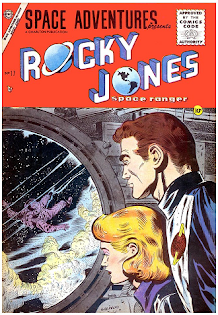 Rocky and Vena
Rocky and Vena(artist's conception)Rocky Jones takes place sometime in a vaguely-defined future, when inhabited planets have coalesced, much like Star Trek's United Federation of Planets, into the United Worlds of the Solar System. Responsible for policing the United Worlds is an interplanetary organization called the Space Rangers, the most famous of whom is our hero, Rocky Jones (Richard Crane). Rocky's sidekick is his co-pilot Winky, which, let's face it, is an awful name for a space hero; his replacement in the second series is named Biff, which is much better, especially when you're called on to engage the bad guys in a series of fist fights in every episode. (It's reassuring to see that even in the future, some things don't change!)
Also as part of Rocky's team is the beautiful navigator Vena, who doesn't fight but does apparently help chart the course; Professor Newton, who in appearance and manor bears a distinct resemblance to William Hartnell, the first Doctor Who; and the professor's young ward Bobby, who's a precocious boy genius and otherwise has no backstory whatsoever. Overseeing Space Ranger operations is Secretary Drake, who has something of a father-son relationship with Rocky. (That's them in the picture in the heading.)
While I wouldn't put Rocky Jones at the pinnacle of science fiction television, it does have a lot going for it. First, there's Richard Crane, who may not be a great actor but who makes for an ideal space hero. He speaks with authority and confidence (and even sounds like a pilot when he's talking with space control), can fight his way out of difficulty, and—most important, in terms of being a convincing leader—knows exactly how to handle his crew. He looks at Winky as a trusted and valued associate, even when he's often providing comic relief; doesn't condescend to Bobby, who really is smart, even if he's just a kid; and treats Vena with respect and a kind of big-brother affection. One of my complaints with Shatner's Captain Kirk is that, in my opinion, he doesn't always exhibit an intuitive and humane understanding of how to deal with his crew as individuals and has to be reminded of this by Doctor McCoy; it's a trait that supervisors often lack in handling their subordinates. Rocky, on the other hand, seems to know how to do this instinctively.
Keeping with the Star Trek theme, the show also offers an interesting alternative means of space exploration, relying on these small, four-or-five man rockets rather than the gigantic starships, and using manned space stations as hubs for intergalactic travel. The show may not have science on its side—that doesn't always appear to have been important to the writers—but from a practical matter, it strikes me as being both an expedient and economical way to deal with the vastness of space, and even in the future, someone's going to have to foot the bill for all this.
And since I raised the matter of science, Rocky Jones is no better or worse than most shows, and it's a definite step above the space serials of the 1930s and 40s. (Hey, the rocket in Commando Cody flies through a space populated by blue skies and clouds!) It's true that the planets all seem to have oxygen-based atmospheres, but at least the crew goes through the motions of checking the readings first. And while the exotic aliens they encounter are all humanoid in appearance and speck colloquial English, they do have a universal translator just in case. At least the details weren't ignored completely.
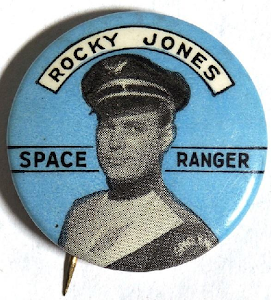 Chief among those exotic aliens are two that bear mentioning: Bovarro, the ruler of Posita, who starts out being hostile to the Federation—I mean the United Worlds—but becomes a trusted ally. He's played by our old friend from Hogan's Heroes, John Banner, and it's always fun to see him turn up in something else. (And thinner!) Rocky's chief nemesis in the first season is the wonderfully snooty Cleolanta (Patsy Parsons), leader of Ophecius. She's always trying to make trouble for the United Worlds (got it right that time), a task complicated by the incompetence of her subordinates; she forever compares them unfavorably to Rocky, so much so that you suspect she'd be much happier with Rocky at her side, both in and out of the office. Whenever her underlings let her down; she all but looks into the camera with a "See what I have to put up with?" expression, and it's hard not to feel some sympathy for her.
Chief among those exotic aliens are two that bear mentioning: Bovarro, the ruler of Posita, who starts out being hostile to the Federation—I mean the United Worlds—but becomes a trusted ally. He's played by our old friend from Hogan's Heroes, John Banner, and it's always fun to see him turn up in something else. (And thinner!) Rocky's chief nemesis in the first season is the wonderfully snooty Cleolanta (Patsy Parsons), leader of Ophecius. She's always trying to make trouble for the United Worlds (got it right that time), a task complicated by the incompetence of her subordinates; she forever compares them unfavorably to Rocky, so much so that you suspect she'd be much happier with Rocky at her side, both in and out of the office. Whenever her underlings let her down; she all but looks into the camera with a "See what I have to put up with?" expression, and it's hard not to feel some sympathy for her.One of the advantages of having been introduced to Rocky Jones through MST3K is that it keeps your expectations kind of low, which means you might be pleasantly surprised. The special effects are actually pretty good for the time, the adventures exciting for the most part; the moralizing kept to a reasonable level (unlike, say, some sci-fi shows we could name), and because the violence is limited to fighting—the Rangers carry weapons but they're never used, and nobody is killed—it's safe for kids without being boring for adults.
Would I pay for the Rocky Jones DVD? Well, I'm not sure about that. (On the other hand, I'd really like a model of the Orbit Jet!) But watching it on YouTube is a no-brainer, and I'm glad I did.
l l l
Having worked our way through 77 Sunset Strip, Bourbon Street Beat, The Roaring '20s, and Hawaiian Eye, we now come to the last of the Warner Bros. detective shows of the era: Surfside 6. And in this case, last does mean least, since by now the assembly line production of P.I. series with alliterative names set in exotic locations has clearly run dry.
Lest anyone get the wrong idea, though, I'm not saying that Surfside 6 fails to give me pleasure and enjoyment, because it does. And I'm not sure, given the formula that applies to these series, that we could have done any better. However, as they might say at MST3K, the setup does have a few flaws, beginning with the cast—or perhaps I should say the number of people in the cast.
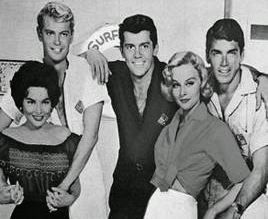 (l-r) Cha Cha, Sandy, Dave, Daphne, and Kenny Unlike those other shows in the WB stable, Surfside 6 is built around three principals: Dave Thorne and Kenny Madison (Lee Patterson and Van Williams), partners in the Surfside detective agency, and Sandy Winfield II (Troy Donahue), a friend who hangs around the agency helping out on cases in the first season, before graduating to full-fledged detective in season two. They work from a houseboat that's been converted into a handsome office that doubles as living quarters for Dave and Kenny, address: Surfside 6. Berthed next to them in the harbor is the beautiful sociality Daphne Dutton (the criminally underused Diane McBain), who occasionally gets involved in their cases. The dock is across the street from Miami Beach's Fontainebleau Hotel, where the obligatory singer, Cha Cha O'Brien (Margarita Sierra) works out of the Boom Boom Room.
(l-r) Cha Cha, Sandy, Dave, Daphne, and Kenny Unlike those other shows in the WB stable, Surfside 6 is built around three principals: Dave Thorne and Kenny Madison (Lee Patterson and Van Williams), partners in the Surfside detective agency, and Sandy Winfield II (Troy Donahue), a friend who hangs around the agency helping out on cases in the first season, before graduating to full-fledged detective in season two. They work from a houseboat that's been converted into a handsome office that doubles as living quarters for Dave and Kenny, address: Surfside 6. Berthed next to them in the harbor is the beautiful sociality Daphne Dutton (the criminally underused Diane McBain), who occasionally gets involved in their cases. The dock is across the street from Miami Beach's Fontainebleau Hotel, where the obligatory singer, Cha Cha O'Brien (Margarita Sierra) works out of the Boom Boom Room.As you might expect, this often results in cast congestion, even given the lead rotation that WB employs in their shows. Lee Patterson and Van Williams are very likeable; they're good at their job, tough when they have to be, and can convince you that you'd hire them. (Kenny came over from the aforementioned Bourbon Street Beat, where he was a law student graduating into the PI business, and it's a nice touch that the writers include the detail that he's now a full-fledged attorney). As an actor, Troy Donahue can often seem stiff, but I'll admit that he has a presence that adds up to being a star; as the least experienced of the trio, Sandy often gets in cases where he has a personal involvement, which sometimes leads to questionable decisions on his part—whether that's because of the writing, or it's meant to reflect that lack of experience, I'm not quite sure. Perhaps a combination of both. I should add that any time a P.I. gets involved with a former flame, it usually means trouble, especially—as was the case with Kenny in one episode—you mistakenly accuse her of murder.
But then there's Cha Cha, by far the weakest character not only in this series, but perhaps in all the WB detective shows. Her presence compares poorly with Connie Stevens, Dorothy Provine and the Frankie Ortega Trio (the musical talent in the other WB detective shows); and the most she can be said to contribute is very lame comic relief. As far as I'm concerned, she can just cha cha her way right out, and give the extra screen time to Diane McBain; a WB regular, you'd think she'd get more visibility than she does. Daphne's not one of those dumb blonde socialites, even though she could occasionally use better judgements with men. She's not only more fun to watch, she's more fun to look at.
The point, as you may have figured, is that we don't really get enough of anyone (except Cha Cha; any time for her is too much), which means it's harder for the likability of the characters to paper over the holes in the plots. There are too many occasions when A doesn't logically lead to B, and you're left wondering if you might have missed something, even though you're pretty sure you didn't leave the room and you weren't thinking about anything else. Even if the writing wasn't the week spot in shows like this, it would be a problem; here, it's that much more noticeable.
If this comes across as negative, it's supposed to—kind of. Compared to the rest of the WB stable, it's just not as good. Compared to non-WB shows—well, you might not be watching it if you weren't already into them. And maybe that's the point. If you loved 77 Sunset Strip, you'll probably like Surfside 6. If you liked Hawaiian Eye, you'll likely find Surfside 6 a fun way to pass an hour. And if you're looking for something to really challenge you as a viewer, you'll probably just keep on looking. As for me, it fits perfectly into the time spot I've given it, and that's perfectly fine with me.
l l l
We're more than halfway through the first season of Maverick, which means I've watched enough of it that I need to let you know, but not enough to draw a fair conclusion, and I think I'm going to return to it sometime in the future, after I've had a chance to talk about its various iterations.
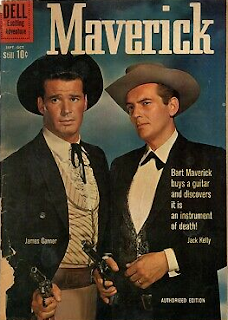 Our hero, as things begin, is James Garner, impeccable as Bret Maverick, the gambler floating through the West looking for big-stakes games and getting involved in a fair amount of trouble along the way, all the while protesting that he's only interested in making money. He's joined in the eighth episode by Jack Kelly as Bret's brother Bart, after the producers discovered they couldn't keep up the pace of making weekly episodes; by rotating the stars, separate crews could be working on two episodes at once. This becomes a WB trademark, but viewers wouldn't have been used to it at the time, so for Bart's first few appearances, the episodes utilize the framing device of having Bret provide the opening and closing narration, as if to reassure viewers that, yes, he's still part of the series. Still, it goes to show that two Mavericks are better than one, and both Garner and Kelly carry their episodes with an easy charm.
Our hero, as things begin, is James Garner, impeccable as Bret Maverick, the gambler floating through the West looking for big-stakes games and getting involved in a fair amount of trouble along the way, all the while protesting that he's only interested in making money. He's joined in the eighth episode by Jack Kelly as Bret's brother Bart, after the producers discovered they couldn't keep up the pace of making weekly episodes; by rotating the stars, separate crews could be working on two episodes at once. This becomes a WB trademark, but viewers wouldn't have been used to it at the time, so for Bart's first few appearances, the episodes utilize the framing device of having Bret provide the opening and closing narration, as if to reassure viewers that, yes, he's still part of the series. Still, it goes to show that two Mavericks are better than one, and both Garner and Kelly carry their episodes with an easy charm.Maverick has always been known for its whimsical and occasionally satirical look at the Western genre in general, and other Western series in particular. However, that was something of an evolutionary process, and we're not quite there yet. At this point, both Bret and Bart are closer to being traditional Western heroes, although as early as the first episode, "War of the Silver Kings," Bret's propensity for outsmarting rather than outgunning his adversary is evident in a convoluted scheme to outsmart the owner of a rival silver mine, something that would become a trademark of the series. "Relic of Fort Tejon," another early episode, is the first overtly comic episode, as Bret has to deal with a camel he won in a poker game, all the while trying to fend off a hired gun. I want to see more of this evolution, though. For instance, we've yet to see the show's famous spoofs of Bonanza and Gunsmoke, and we've only met two of the show's colorful recurring characters, Dandy Jim Buckley (Efrem Zimbalist Jr.) and Samantha Crawford (Diane Brewster), once each.
James Garner famously left Maverick after three of the show's five seasons, having won a lawsuit against Warner Bros. freeing him from his contract, and the series would try to compensate for Garner's absence by introducing still more Maverick relatives, cousin Beau (Roger Moore) and brother Brent (Robert Colbert). By the final season, Kelly is left to go it as the lone Maverick, with some of Garner's old episodes rerun to fill out the inventory. When you think about it, that's actually not a bad idea, considering that it would have been a year or two since anyone saw them, and you wouldn't have been exposed to them via DVDs or binging back then.
What all this means is that I've done my due diligence by letting you know what I've been watching, but we'll return to Maverick in another season or so, when the series has become what it is, to give you a fuller picture. But as to whether or not you should dive in—by all means! It's enjoyable, whimsical, with two strong and likable leads, and fine performances by guest stars. It may well vie with Sunset Strip as WB's best. TV
Published on November 09, 2022 05:00
November 7, 2022
What's on TV? Sunday, November 6, 1955

 Unless I'm mistaken, I think we have a winner in the contest for the year's best program description: WSTV's 6:00 p.m. listing for Lassie. "Dog Drama." That about says it, doesn't it? Elsewhere, NBC Opera Theater makes its season debut with Lukas Foss' made-for-TV opera Griffelkin, about a young devil residing in Hell's nursery. That's preceded by
an interview
with former president Herbert Hoover, when he had been out of office for nearly 23 years (2:00 p.m., WTRF). You Are There takes us to the O.K. Corral, as Walter Cronkite and his news team interview the Earps and Clantons, played by Robert Bray, John Larch, John Anderson, DeForest Kelley (who, sadly, doesn't play Doc Holliday), Arthur Reese, and Ernest Baldwin. Not a bad day of broadcasting, as seen in the Pittsburgh Edition.
Unless I'm mistaken, I think we have a winner in the contest for the year's best program description: WSTV's 6:00 p.m. listing for Lassie. "Dog Drama." That about says it, doesn't it? Elsewhere, NBC Opera Theater makes its season debut with Lukas Foss' made-for-TV opera Griffelkin, about a young devil residing in Hell's nursery. That's preceded by
an interview
with former president Herbert Hoover, when he had been out of office for nearly 23 years (2:00 p.m., WTRF). You Are There takes us to the O.K. Corral, as Walter Cronkite and his news team interview the Earps and Clantons, played by Robert Bray, John Larch, John Anderson, DeForest Kelley (who, sadly, doesn't play Doc Holliday), Arthur Reese, and Ernest Baldwin. Not a bad day of broadcasting, as seen in the Pittsburgh Edition.-2- KDKA (Pittsburgh) (ABC, CBS, Du Mont, NBC) MORNING 9:40 Sermonette—Religion 9:45 Christian Science Heals 10:00 Lamp Unto My Feet—Religion “The Bright Red Carpet” 10:30 Look Up and Live—Religion 11:00 This Is the Life—Religion 11:30 The Parson’s Mailbox AFTERNOON 12:00 Super Circus—Clowns Guest: Mary Hartline 12:30 To Be Announced 12:45 Jon Gnagy—Art 1:00 Ramar of the Jungle 1:30 Annie Oakley—Western 2:00 NEWS 2:15 Music and Meditation 2:30 Life Begins at 80 3:00 Theater—Drama “One” 4:00 December Bride—Comedy 4:30 City Detective—Drama 5:00 It’s Always Jan—Comedy 5:30 Captain Gallant EVENING 6:00 Wilkens Amateur Hour 7:00 DEATH VALLEY DAYS 7:30 MOVIE—“The Constant Husband” COLOR 9:00 TV PLAYHOUSE “The Mechanical Heart” 10:00 LORETTA YOUNG 10:30 DR. HUDSON’S SECRET JOURNAL—Drama 11:00 DREW PEARSON—News 11:15 Playhouse 15—Drama 11:30 NEWS 11:35 MOVIE—Musical Comedy “Song of the Open Road”
-6- WJAC (Johnstown) (CBS, NBC) MORNING 9:55 NEWS 10:00 Lamp Unto My Feet—Religion “The Bright Red Carpet” 10:30 Look Up and Live—Religion 11:00 UN in Action 11:30 Contest Carnival AFTERNOON 12:00 Buffalo Bill, Jr. 12:30 Wild Bill Hickok 1:00 Industry on Parade 1:15 Heaven Speaks—Martin 1:30 O. Roberts—Evangelist 2:00 Disneyland—Walt Disney “The Story of Robin Hood,” Part 1 3:00 Dr. Spock—Child Care 3:30 Zoo Parade—Animals 4:00 NBC Opera Theater RETURN “Griffelkin” 5:30 Captain Gallant EVENING 6:00 Meet the Press—Panel Guest: Donald Quarles, Secretary of the Air Force. Moderator: Ned Brooks 6:30 Roy Rogers—Western 7:00 IT’S A GREAT LIFE 7:30 MOVIE—“The Constant Husband” COLOR 9:00 TV PLAYHOUSE “The Mechanical Heart” 10:00 LORETTA YOUNG 10:30 BOB CUMMINGS SHOW 11:00 NEWS—Walter Cronkite 11:15 MOVIE—Drama “Passing Stranger” 12:15 NEWS
-7- WTRF (Wheeling) (ABC, NBC) MORNING 11:00 The Christophers--Religion 11:30 MOVIE—To Be Announced AFTERNOON 12:30 Industry on Parade 12:45 Christian Science Heals 1:00 TV College—Bethany 1:30 Frontiers of Faith 2:00 Herbert Hoover—Talk SPECIAL 3:00 BOWLING 4:00 NBC Opera Theater RETURN “Griffelkin” 5:30 Annie Oakley—Western EVENING 6:00 Disneyland—Walt Disney “The Story of Robin Hood,” Part 1 7:00 IT’S A GREAT LIFE 7:30 MOVIE—“The Constant Husband” COLOR 9:00 TV PLAYHOUSE “The Mechanical Heart” 10:00 LORETTA YOUNG 10:30 JUSTICE—Drama 11:00 NEWS 11:05 Ethel Barrymore—Drama 11:35 MOVIE—Drama “Algiers”
-9- WSTV (Steubenville) (ABC, CBS) MORNING 10:00 Lamp Unto My Feet—Religion “The Bright Red Carpet” 10:30 Look Up and Live—Religion 11:00 UN in Action 11:30 Contest Carnival AFTERNOON 12:00 Winky Dink and You 12:30 The Christophers—Religion 1:00 O. Roberts—Evangelist 1:30 Neapolitan Serenade 2:00 The Greatest of These 2:30 To Be Announced 3:00 Talkaround 3:30 Adventure 4:00 Super Circus 4:30 Let’s Take a Trip 5:00 MOVIE—To Be Announced EVENING 6:00 Lassie—Dog Story 6:30 You Are There “The Fight at the O.K. Corral” 7:00 YOU ASKED FOR IT 7:30 JACK BENNY 8:00 ED SULLIVAN Guests: Liberace, Phil Silvers, Rise Stevens, David Whitfield, Linon 9:00 G.E. THEATER 9:30 ALFRED HITCHCOCK “Salvage” 10:00 BREAK THE BANK 10:30 WHAT’S MY LINE?—Quiz 11:00 NEWS—Walter Cronkite 11:15 Weather 11:20 WRESTLING—Hollywood
10 WFBG (Altoona) (ABC, CBS, NBC) MORNING 10:00 Lamp Unto My Feet—Religion “The Bright Red Carpet” 10:30 Look Up and Live—Religion 11:00 UN in Action 11:30 Contest Carnival AFTERNOON 12:00 Winky Dink and You 12:30 Faith for Today—Religion 1:00 What’s Your Trouble? 1:15 Christian Science Heals 1:30 Life of Triumph—Religion 2:00 PRO FOOTBALL—Green Bay Packers vs. Chicago Bears 4:30 Let’s Take a Trip 5:00 Man to Man—Religion 5:10 The Pastor—Religion 5:30 Justice—Drama “Booby Trap” EVENING 6:00 Star Tonight—Drama “The Little Wife” 6:30 Meet Millie—Comedy 7:00 LASSIE—Drama 7:30 JACK BENNY 8:00 ED SULLIVAN Guests: Liberace, Phil Silvers, Rise Stevens, David Whitfield, Linon 9:00 G.E. THEATER 9:30 ORIGINAL AMATEUR HOUR 10:00 APPOINTMENT WITH ADVENTURE—Drama “Stage of Siege” 10:30 CHANCE OF A LIFETIME 11:00 MOVIE—Drama “Babes in Bagdad”
16 WENS (Pittsburgh) (ABC, CBS, NBC) EVENING 6:00 Meet the Press—Panel Guest: Donald Quarles, Secretary of the Air Force. Moderator: Ned Brooks 6:30 Big Picture—Documentary 7:00 YOU ASKED FOR IT 7:30 FOUR STAR PLAYHOUSE “Spray of Bullets” 8:00 ED SULLIVAN Guests: Liberace, Phil Silvers, Rise Stevens, David Whitfield, Linon 9:00 G.E. THEATER 9:30 M-G-M PARADE—Variety 10:00 MOVIE—Drama “The Angelus”
56 WARD (Pittsburgh) (ABC, CBS, Du Mont) AFTERNOON 4:30 Let’s Take a Trip EVENING 6:00 Stars of Tomorrow 6:30 Featurette 7:30 JACK BENNY 8:00 CHURCHES FOUNDATION 9:00 G.E. THEATER 9:30 THE CHRISTOPHERS 10:00 BIG PICTURE 10:30 CLERGYMAN’S STUDY
TV
Published on November 07, 2022 05:00
November 5, 2022
This week in TV Guide: November 5, 1955
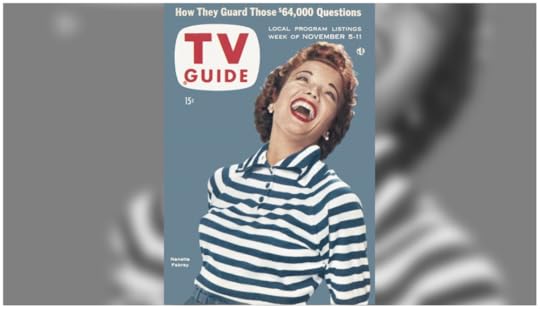
 I'm not quite sure that "Operation Hush" is the best way to describe the process by which quiz shows like The $64,000 Question (Tuesday, 10:00 p.m., CBS) keep their questions secret from the public and the contestants appearing on their programs. After all, when I hear the word "hush," I think of hush money, which is what you pay in order to keep secret something that you'd rather other people not know about. Often, that something happens to be illegal. Do you suppose my years in politics have made me suspicious, cynical, hard-boiled when it comes to things like this? Or is it just that, nearly 70 years later, all of us benefit from hindsight in knowing that most of these shows were rigged?
I'm not quite sure that "Operation Hush" is the best way to describe the process by which quiz shows like The $64,000 Question (Tuesday, 10:00 p.m., CBS) keep their questions secret from the public and the contestants appearing on their programs. After all, when I hear the word "hush," I think of hush money, which is what you pay in order to keep secret something that you'd rather other people not know about. Often, that something happens to be illegal. Do you suppose my years in politics have made me suspicious, cynical, hard-boiled when it comes to things like this? Or is it just that, nearly 70 years later, all of us benefit from hindsight in knowing that most of these shows were rigged?Frank De Blois describes how the process works on Question, beginning with the questions themselves, which originate with college professor and TV personality Dr. Bergen Evans. They're then passed through for approval by the production team, after which they're sealed in a box which is locked in a vault at Manufacturers Trust bank. On the night of the broadcast, two bank executives, accompanied by a pair of guards, unlock the vault, remove the sealed box, and take a cab to the studio, arriving just before showtime. Once a contestant enters the famed soundproof "isolation booth," all he can hear is host Hal March's voice, and all he can see is March's face.

De Blois relates the efforts made by other programs, ones that offer considerably less than $64,000: I've Got a Secret, Masquerade Party, What's My Line? They're whimsical enough (how do you get someone to refrain from boasting that they're this week's Mystery Guest?), but it's the big-money quiz shows we're interested in. The scandal didn't start with Question, of course; Dotto and Twenty-One were the first programs to be implicated, but eventually, in September 1958, the truth catches up.
According to the always-reliable Wikipedia , "The $64,000 Question was closely monitored by its sponsor's CEO, Revlon's Charles Revson, who often interfered with production, especially attempting to bump contestants he himself disliked, regardless of audience reaction. Revson's brother, Martin, was assigned to oversee production, including heavy discussions of feedback the show received." One of the show's gimmicks, an IBM sorting machine that supposedly selected lower-dollar questions at random, was just a prop; all of the cards, with the questions on them, were identical. Teddy Nadler, one of the show's most famous winners, had been shown some of the questions beforehand, but the producers maintained that he already knew the answers.
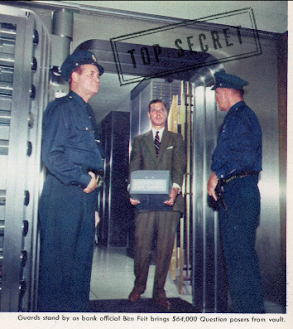 One of the things you'll see as we go through this week's issue is the importance that sponsors play in 1950s television. Today, sponsors seldom even choose the programs in which their commercials appear*, but at one time it was the sponsors that created the programs themselves, and even if they simply signed up to pay the freight, so to speak, they insinuated themselves into the program in ways we'd probably find completely unacceptable.
One of the things you'll see as we go through this week's issue is the importance that sponsors play in 1950s television. Today, sponsors seldom even choose the programs in which their commercials appear*, but at one time it was the sponsors that created the programs themselves, and even if they simply signed up to pay the freight, so to speak, they insinuated themselves into the program in ways we'd probably find completely unacceptable.*One reason why sponsor boycotts are often of little practical value is that commercial time purchases are often determined by brokers whose jobs are to fill the available slots. A sponsor withdrawing from a particular show might make the broker's job more difficult, but it doesn't necessarily mean the sponsor endorsed the program in question, nor does it always produce the cause-and-effect that the boycott organizers hope for.
In the case of the quiz show scandals, the desire was to manipulate the winners (whether at the sponsor's whim, as with Question, or to attract larger viewing audiences, as was the motive with other programs). In other instances, sponsors tried to manipulate the content of individual programs. I'll get to that in a tick, if you'll just be a little more patient.
l l l
A couple of weeks ago, we saw the dramatic entry of Walt Disney into the weekly television business, and while Disney may have been the first major studio to take the plunge, they won't be the only one. This week, the focus turns to two of the giants of Hollywood, Warner Brothers and M-G-M, and their entries into the television sweepstakes (both, incidentally, on ABC). The early verdict: while Warner may know how to make movies for theaters, the studio "still has much to learn about producing movies for TV." Meanwhile, M-G-M may have taken "the easiest way out," they also may have produced "the most entertaining show" of all the movie studios this year.
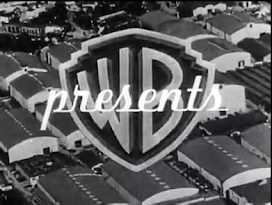 Warner Bros. Presents is a "wheel" series, consisting of three hour-long dramas rotating on an every-third-week schedule. All three are based on, and bear the titles of, past WB movie hits: Kings Row, Casablanca, and Cheyenne. Looking at them in order, Kings Row features Jack Kelly (the role played in the movie by Robert Cummings), Nan Leslie (the movie's Ann Sheridan), and Robert Horton (played memorably by Ronald Reagan), in "soap opera-ish stories" about a young psychiatrist battling the superstitions of the early 1900s; Casablanca, which perhaps has the toughest legacy to live up to, has Charles McGraw as Humphrey Bogart (a thankless task), "who seldom has a chance against heavily written scripts"; and Cheyenne, the most loosely based of the three, which stars Clint Walker as a cowboy who gets into "standard scrapes with bad buys, Indians and cattle rustlers in a rather immature Western."
Warner Bros. Presents is a "wheel" series, consisting of three hour-long dramas rotating on an every-third-week schedule. All three are based on, and bear the titles of, past WB movie hits: Kings Row, Casablanca, and Cheyenne. Looking at them in order, Kings Row features Jack Kelly (the role played in the movie by Robert Cummings), Nan Leslie (the movie's Ann Sheridan), and Robert Horton (played memorably by Ronald Reagan), in "soap opera-ish stories" about a young psychiatrist battling the superstitions of the early 1900s; Casablanca, which perhaps has the toughest legacy to live up to, has Charles McGraw as Humphrey Bogart (a thankless task), "who seldom has a chance against heavily written scripts"; and Cheyenne, the most loosely based of the three, which stars Clint Walker as a cowboy who gets into "standard scrapes with bad buys, Indians and cattle rustlers in a rather immature Western." There's a feeling, expressed elsewhere as well as in this article, that Warner felt all they had to do is show up with their name, and the viewers would follow. Indeed, all three shows are "well-produced and competently acted," and sport both a "lavish budget and technical skill." What they don't have are quality stories; as the review says, "the play's still the thing." That's a lesson that M-G-M seems to take to heart in their offering, M-G-M Parade. Unlike WBP, Parade attempts no new programming, but instead dips into the studio's massive library of hit movies, offering clips and short subjects, along with previews of coming attractions.
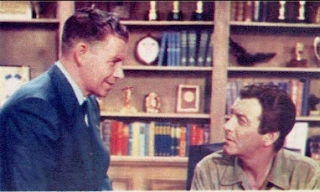 George Murphy (L) interviews Robert TaylorIt's a smart idea; "Most viewers have fond recollections of old movies." So who'd be able to resist, for example, Judy Garland, at 12, singling "You Made My Love You," or clips from past and present stars such as Barrymore, Astaire, or host (and future U.S. senator) George Murphy? Unlike WBP, Parade, for the most part, delivers on its potential. True, the writers haven't given Murphy much to work with as host, sticking him with remarks that are often "deadly dull." He's a pleasant presence, though, well-suited to his role. Having seen some episodes of Parade myself—TCM showed them a few years ago; since we've cut the cord, I don't know if they still do—the most disconcerting thing about it might be seeing the black-and-white clips from those great technicolor movies. It just doesn't look right.
George Murphy (L) interviews Robert TaylorIt's a smart idea; "Most viewers have fond recollections of old movies." So who'd be able to resist, for example, Judy Garland, at 12, singling "You Made My Love You," or clips from past and present stars such as Barrymore, Astaire, or host (and future U.S. senator) George Murphy? Unlike WBP, Parade, for the most part, delivers on its potential. True, the writers haven't given Murphy much to work with as host, sticking him with remarks that are often "deadly dull." He's a pleasant presence, though, well-suited to his role. Having seen some episodes of Parade myself—TCM showed them a few years ago; since we've cut the cord, I don't know if they still do—the most disconcerting thing about it might be seeing the black-and-white clips from those great technicolor movies. It just doesn't look right.Warner Bros. eventually gets it right, of course. Cheyenne, the only surviving element of Warner Bros. Presents, runs for seven successful seasons, and the studio becomes an assembly line for PI and Western dramas on ABC. M-G-M, meanwhile, has a more checkered history, but has several hits in co-production with other companies, and has its share of successes. It just goes to show, I guess, that television is your friend.
l l l
No matter where we turn, stories about sponsors keep coming up, and in the New York Teletype, we learn about a recalcitrant sponsor: Pontiac has withdrawn as sponsor of the upcoming Project 20, an occasional series of documentaries which will run on NBC into the 1960s. According to Bob Stahl, speculation is that "the auto company felt it unwise to be associated with the first in the series, 'Nightmare in Red'—even though the show is anti-Communist." The network has another sponsor lined up, and now the episode is scheduled to air sometime in January. Don't worry; the Cold War isn't going anywhere.
Meanwhile, Dan Jenkins reports that the sponsors would like some changes to the format of none other than: M-G-M Parade. Those elements that TV Guide thought made the show successful—clips of old movies and short subjects—apparently aren't as popular with the sponsors, who want "more new film, less old; more attention to commercials, less to picture plugs." Oh well.
Also in the Teletype, Ernie Kovacs has gotten fine reviews for his recent pinch-hitting on Tonight in place of Steve Allen, and the talk is that television's most creative force may get his on show on NBC as a result. He does, eventually; he hosts a summer replacement series for Sid Caesar next summer, after which he becomes the regular Monday-Tuesday host for Tonight, remaining until Allen leaves the program in 1957.
And here's something that sponsors are sure to appreciate: NBC and its affiliates now cover "90 percent of the Nation's TV homes with colorcasts, and are doing so with 10 percent of the network's programming schedule." The motive is to push sales of those RCA color televisions.
l l l
We'll continue with our look at sponsors, but first this message about what's on TV this week. (When's the last time you saw a program interrupt a sponsor?)
Believe it or not, there used to be a time, before it joined the Ivy League, when the University of Pennsylvania used to be a significant player in college football, winning the national championship as recently as 1924. There were even concerns, when television started to affect the sport, that Penn might cut its own TV deal. This, however (and unfortunately for the university), is 1955, not 1924. Nonetheless, the Quakers are on the game of the week this Saturday (1:15 p.m., NBC), although it might be due to their opponent: sixth-ranked Notre Dame. The Fighting Irish rout Penn 46-14, but the news is not all bad: it's the only time this season that Penn scores in double digits, en route to an 0-9 season and a 22-game losing streak.
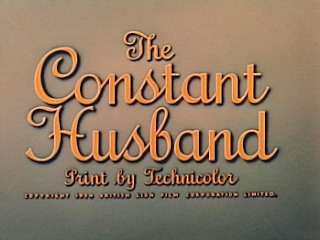 Sunday sees a genuine television first: the American premiere of the British movie The Constant Husband, the first time that a theatrical movie has ever appeared on American television before being shown in theaters. (Due to the distributor's bankruptcy, the movie hadn't even premiered in London until the past April 21.) The farce stars Rex Harrison as an amnesiac who turns out to be married to six different women. (7:30 p.m., NBC, in color.) In the meantime, while we don't have anyone to match up with Ed Sullivan, that doesn't mean we can't check out his lineup: Liberace, Phil Silvers, opera star Rise Stevens, British singer David Whitfield, and Belgian circus clown Linon. (8:00 p.m., CBS)
Sunday sees a genuine television first: the American premiere of the British movie The Constant Husband, the first time that a theatrical movie has ever appeared on American television before being shown in theaters. (Due to the distributor's bankruptcy, the movie hadn't even premiered in London until the past April 21.) The farce stars Rex Harrison as an amnesiac who turns out to be married to six different women. (7:30 p.m., NBC, in color.) In the meantime, while we don't have anyone to match up with Ed Sullivan, that doesn't mean we can't check out his lineup: Liberace, Phil Silvers, opera star Rise Stevens, British singer David Whitfield, and Belgian circus clown Linon. (8:00 p.m., CBS)Abby Mann, who will win an Oscar in 1961 for writing Judgment at Nuremberg (and later on creates the TV series Kojak) is the author of "The World to Nothing," Monday's Robert Montgomery Presents (9:30 p.m., NBC), the story of a movie star (Eddie Albert) who realizes that his movie success has cost him everything important in his personal life. The night's second prestige anthology, Studio One, opens its eighth season with a tense submarine drama, "Shakedown Cruise," starring Richard Kiley, Lee Marvin, and Martin Brooks. (10:00 p.m., CBS)
The new, more refined Milton Berle Show features a musical revue on Tuesday (8:00 p.m., NBC), directed by and starring Uncle Miltie, with the Will Mastin Trio starring Sammy Davis, Jr., Gloria DeHaven, and Gogi Grant. If you want to see it from the beginning, though, you'll have to pass up the last half hour of this week's Warner Bros. Presents, Casablanca, with guest star Maureen O'Sullivan as a woman whose newspaperman husband was recently released from four years in a Soviet labor camp. (7:30 p.m, ABC)
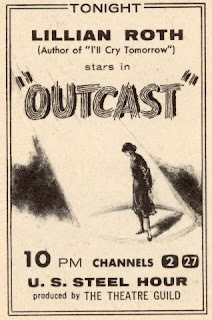 On Wednesday, Lillian Roth makes her television dramatic debut in the U.S. Steel Hour episode "Outcast." (10:00 p.m., CBS). She plays "a once-successful Hollywood writer who is driven to drink by her husband's infidelity and the tragic death of her only child. Her friends try to help her and even get her a chance to resume her career. But she is afraid." Although "Outcast" is based on a story by Frank Gabrielson, the life of Elaine, the character she plays, is remarkably similar to Roth's own life and her battle to come back from alcoholism, which she frankly shared in
a memorable appearance
on This Is Your Life in 1953, and later detailed in her 1954 autobiography, I'll Cry Tomorrow (turned into a 1955 movie starring Susan Hayward). Roth, one of the first celebrities to publicly discuss struggling with alcoholism, is credited with helping facilitate the public understanding of alcoholism as a disease. As for her performance in "Outcast," the New York Times TV critic Jack Gould calls it "magnificent," and adds that "In its understanding, in its poignancy, in its sensitivity, her performance was one that can only be called memorable."
On Wednesday, Lillian Roth makes her television dramatic debut in the U.S. Steel Hour episode "Outcast." (10:00 p.m., CBS). She plays "a once-successful Hollywood writer who is driven to drink by her husband's infidelity and the tragic death of her only child. Her friends try to help her and even get her a chance to resume her career. But she is afraid." Although "Outcast" is based on a story by Frank Gabrielson, the life of Elaine, the character she plays, is remarkably similar to Roth's own life and her battle to come back from alcoholism, which she frankly shared in
a memorable appearance
on This Is Your Life in 1953, and later detailed in her 1954 autobiography, I'll Cry Tomorrow (turned into a 1955 movie starring Susan Hayward). Roth, one of the first celebrities to publicly discuss struggling with alcoholism, is credited with helping facilitate the public understanding of alcoholism as a disease. As for her performance in "Outcast," the New York Times TV critic Jack Gould calls it "magnificent," and adds that "In its understanding, in its poignancy, in its sensitivity, her performance was one that can only be called memorable."I mentioned Dr. Bergen Evans in this week's lede, and he hosts the panel show Down You Go* (Thursday, 9:30 p.m., ABC), with panelists Fran Coughlin, Sherl Stern, Patricia Cutts, and John Kiernan, Jr. And your first question might be: who are these people? Well, they were all personalities, having written for or appeared on panel shows in the 1950s. They were probably quick-thinking, witty, conversant, and good conversationalists, essential in the era of live television, and at a time when television has to create its own stars.
*Down You Go, which someone resembles Wheel of Fortune, ran for five seasons, and is one of only six series to appear on all four broadcast networks—ABC, NBC, CBS, and DuMont. The others: The Arthur Murray Party, Pantomime Quiz, Tom Corbett, Space Cadet, The Ernie Kovacs Show, and The Original Amateur Hour.
If you're feeling lost these days, it could be worse: you could be "The Man Without a Country," the classic by Edward Everett Hale, about an American accused of treason who curses the United States during his trial and is sentenced to live the remainder of his life about ship, never to see or hear of his homeland again. Cliff Robertson played Philip Nolan in the 1973 telemovie, but in this week's Matinee Theater colorcast (Friday, 3:00 p.m., NBC), but in today's presentation he's played by Peter Hansen, who as Peter Hanson will star as Lee Baldwin on General Hospital for nearly 30 years.
l l l
 Finally, our look at how sponsors get involved in the content of the shows they broadcast. I've given examples in the past of the control that sponsors exerted over programs during the 1950s. Today, sponsors seldom even choose the programs in which their commercials appear*, but at one time it was the sponsors that created the programs themselves, and even if they simply signed up to pay the freight, so to speak, they insinuated themselves into the program in ways we'd probably find completely unacceptable.
Finally, our look at how sponsors get involved in the content of the shows they broadcast. I've given examples in the past of the control that sponsors exerted over programs during the 1950s. Today, sponsors seldom even choose the programs in which their commercials appear*, but at one time it was the sponsors that created the programs themselves, and even if they simply signed up to pay the freight, so to speak, they insinuated themselves into the program in ways we'd probably find completely unacceptable.*One reason why sponsor boycotts are often of little practical value is that commercial time purchases are often determined by brokers whose jobs are to fill the available slots. A sponsor withdrawing from a particular show might make the broker's job more difficult, but it doesn't necessarily mean the sponsor endorsed the program in question, nor does it always produce the cause-and-effect that the boycott organizers hope for.
Most of you are familiar with the many stories that Rod Serling has told about sponsor interference, but this week's article, "Why Producers Get Gray," will provide you some additional examples that might make you, in Tom Wolfe's words, shake your head like the Fool Killer, "frustrated by the magnitude of the opportunity." In Judy Garland’s TV “spectacular,” the New York skyline abruptly underwent a spectacular change. Someone eliminated the familiar Chrysler building, because the show was sponsored by Ford.Publicity pictures for CBS’ Crusader series were hastily scrapped. They showed the hero smoking a cigar. The sponsor is a cigaret company.When Eartha Kitt sang "C’Est Si Bon" on Ed Sullivan’s show, the lyrics were hastily revised, so that Eartha would yearn for a Lincoln (Ed’s sponsor), instead of a "Cadillac car."The CBS daydrama, The Secret Storm, was originally titled "The Storm Within." That title seemed too descriptive of the sponsor's product— Bisodol .Two network newscasters ran the same films of a man being lowered to safety from a bridge. CBS’ Doug Edwards pointed out that the man was given a cigar. NBC’s John Cameron Swayze, whose show is sponsored by a cigaret firm, called it "a smoke."There was confusion last season over a show’s title. Was it Hey, Mulligan! or The Mickey Rooney Show? The first was widely publicized, until one of the sponsors, Green Giant Peas, recalled a competitor's mulligan stew.When Perry Como was ill, Eddie Fisher commented, at the end of one of his Coca-Cola telecasts, "Get well, P.C." His sponsors, constantly vying with Pepsi-Cola, hurriedly advised him never to use those initials again.I suppose we could just say that they're protecting their turf. Psychiatrists would probably say they're demonstrating a latent insecurity, and prescribe something for them. But first they'd better check to make sure that prescription isn't for a rival pharma company's product. TV
Published on November 05, 2022 05:30
It's About TV!
Insightful commentary on how classic TV shows mirrored and influenced American society, tracing the impact of iconic series on national identity, cultural change, and the challenges we face today.
- Mitchell Hadley's profile
- 5 followers



